Refrigeration Cycle
Solving Common Heat Pump Refrigeration Cycle Issues

Struggling with problematic issues in your heat pump refrigeration cycle? Search no more! This article is here to equip you with the understanding and methods needed to address frequent challenges that could occur in your heat pump system.
From identifying refrigerant leaks to troubleshooting low pressure, we’ve got you covered.
So, let’s dive into the world of heat pump maintenance and start serving you with effective solutions.
Key Takeaways
- Troubleshooting low refrigerant pressure is crucial and involves inspecting for leaks, checking refrigerant charge, evaluating the functionality of the expansion valve, and troubleshooting low-pressure sensors.
- Identifying and preventing refrigerant leaks can be done through visual inspection, using electronic leak detectors, and adding UV dye. Common causes of refrigerant leaks include corrosion in refrigerant lines, poor installation, and wear and tear.
- Regular inspection and maintenance are necessary to detect and address refrigerant leaks. This includes preventing corrosion, optimizing refrigerant flow, and ensuring adequate airflow throughout the system.
- Low refrigerant pressure can negatively impact heat pump efficiency and performance, leading to reduced heating or cooling capacity, longer running times, higher energy consumption, and increased risk of component failure. Troubleshooting steps for low refrigerant pressure include visual inspection, checking refrigerant levels, performing a leak test, repairing leaks, and recharging the system with appropriate refrigerant.
Understanding the Basic Refrigeration Cycle in Heat Pumps
As we delve into the topic of understanding the basic refrigeration cycle in heat pumps, it’s important to grasp the fundamental principles that govern this process. Heat pump efficiency is a key factor in ensuring optimal performance and energy savings. Regular heat pump maintenance is essential to maintain efficiency and prevent potential issues.
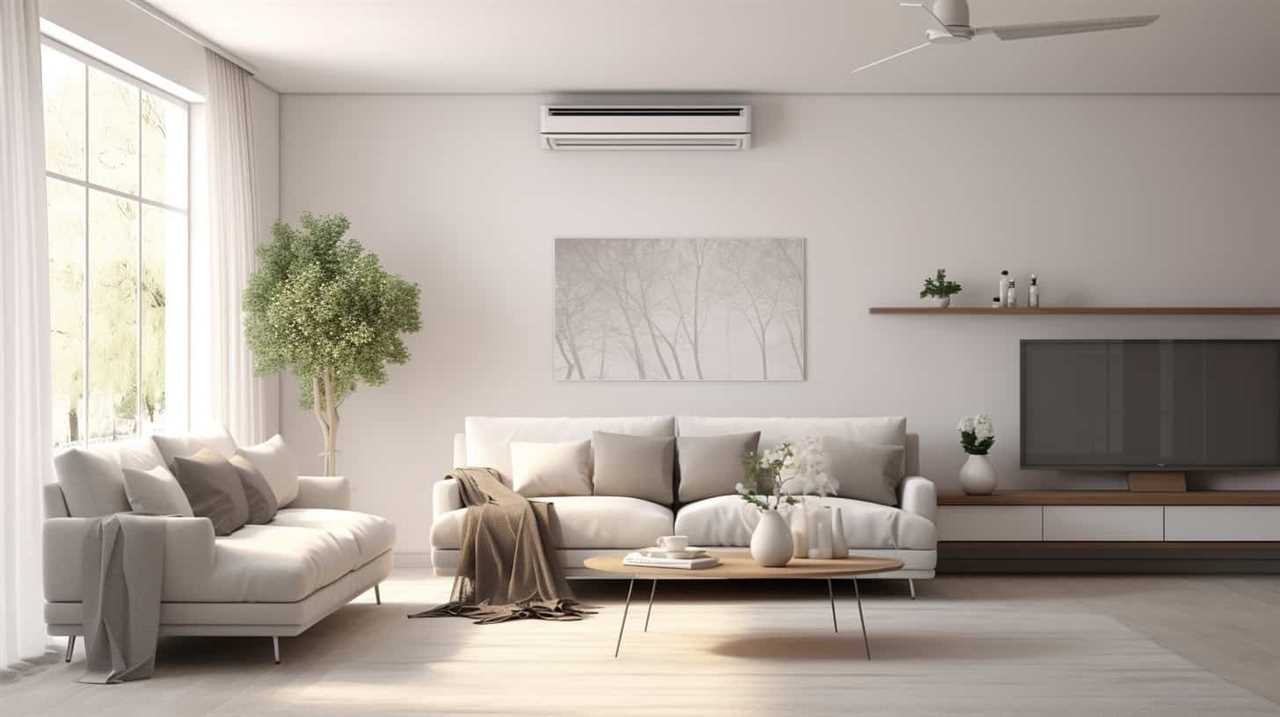
To understand the refrigeration cycle, we must first understand the components involved: the compressor, condenser, expansion valve, and evaporator. The cycle starts with the compressor, which raises the pressure and temperature of the refrigerant. The refrigerant then flows to the condenser, where it releases heat to the surrounding environment.
Next, the expansion valve lowers the pressure, causing the refrigerant to cool down as it enters the evaporator. In the evaporator, heat is absorbed from the surrounding air, cooling it down. Finally, the refrigerant returns to the compressor to restart the cycle. Understanding this process is crucial for heat pump efficiency and maintenance.
Now, let’s move on to identifying common refrigerant leaks in heat pump systems.
Identifying Common Refrigerant Leaks in Heat Pump Systems
When it comes to identifying common refrigerant leaks in heat pump systems, there are several key points to consider.
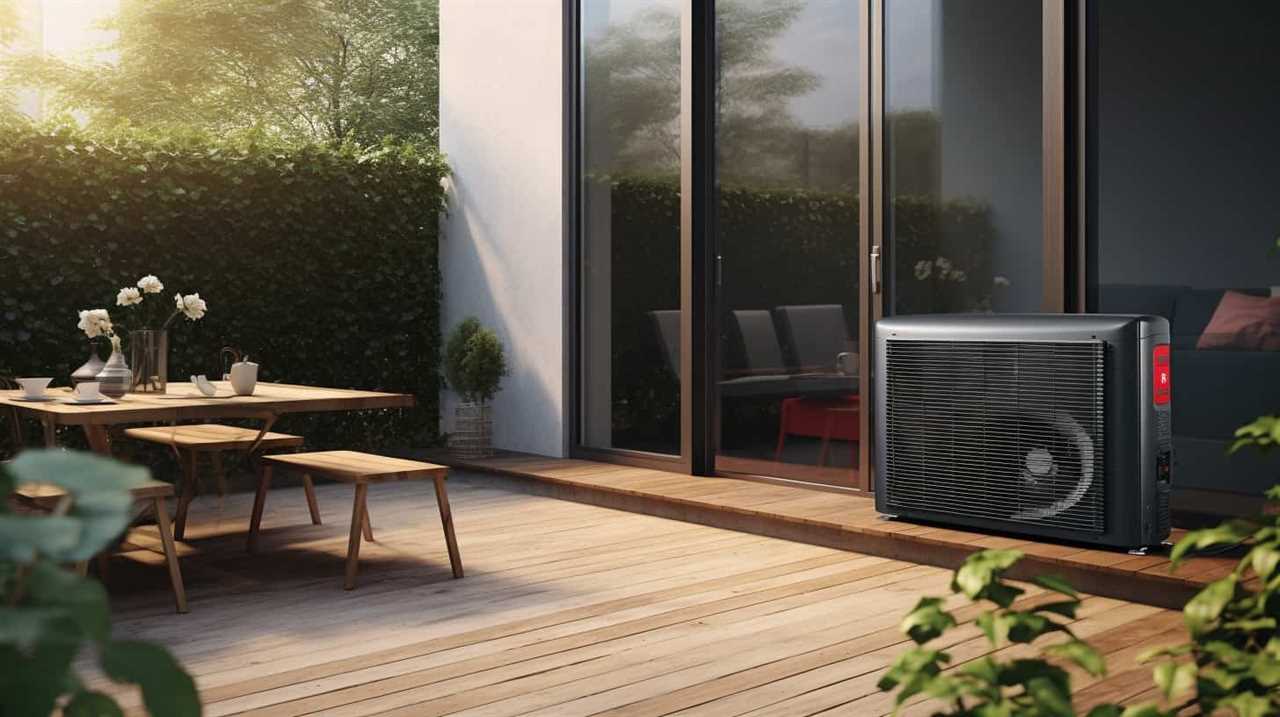
First, understanding leak detection methods is crucial in order to effectively locate and address the issue.
Second, it’s important to be aware of the common causes of refrigerant leaks, such as corrosion, vibration, and faulty connections.
Leak Detection Methods
We use various leak detection methods to identify common refrigerant leaks in heat pump systems. The goal of refrigerant leak detection is to identify and repair any leaks as quickly as possible to minimize the loss of refrigerant, prevent system inefficiency, and reduce environmental impact.
Some common leak detection methods include visual inspection, using electronic leak detectors, and using ultraviolet (UV) dye. Visual inspection involves checking for any visible signs of leaks such as oil stains, frost or ice buildup, or corroded fittings. Electronic leak detectors utilize sensors to detect the presence of refrigerant gases in the air. UV dye is added to the refrigerant system, and a UV light is used to identify any leaks by illuminating the dye.

These leak detection methods help us pinpoint the location of leaks, allowing us to take appropriate action to prevent further damage or system failure.
Moving on to the next section, let’s explore the causes of refrigerant leaks.
Causes of Refrigerant Leaks
Our goal is to identify the causes of refrigerant leaks in heat pump systems. Refrigerant leaks can occur due to various reasons, and it’s important to understand these causes in order to effectively prevent and repair them.
Here are four common causes of refrigerant leaks:
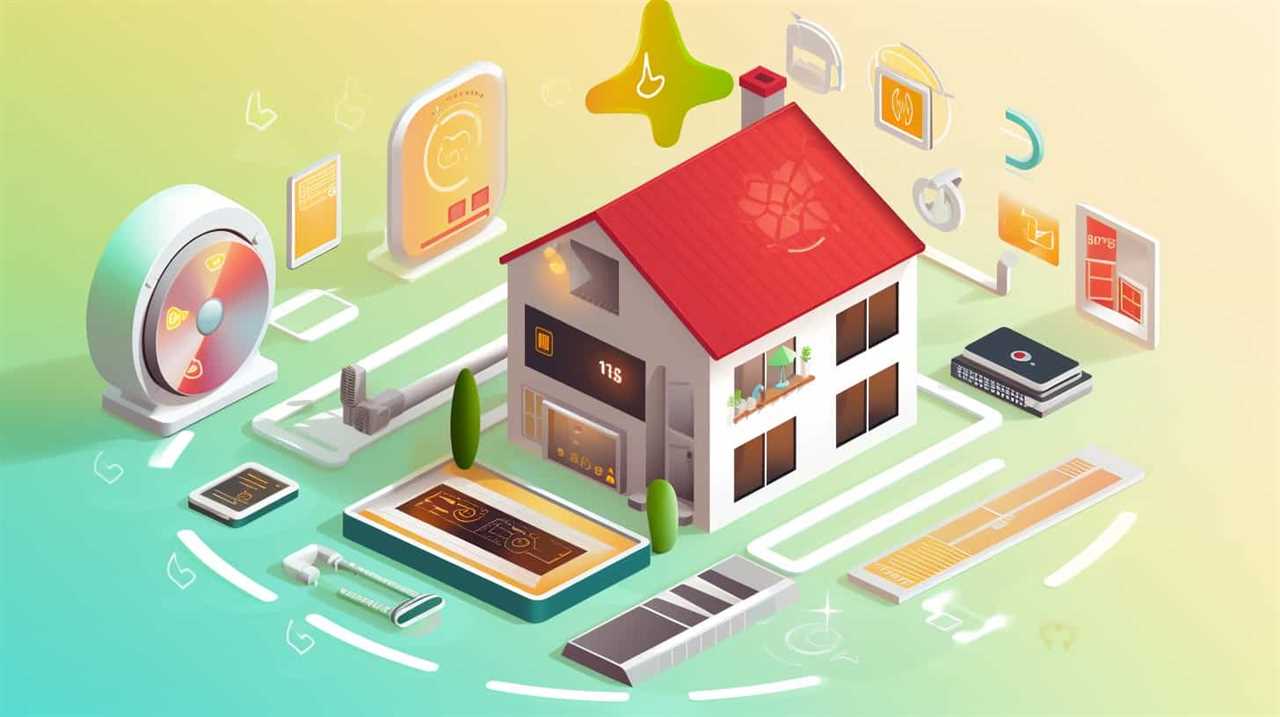
-
Corrosion: Over time, the refrigerant lines can corrode, leading to small holes or cracks through which the refrigerant can escape.
-
Poor installation: Improper installation of the heat pump system can result in loose connections or damaged components, causing refrigerant leaks.
-
Wear and tear: Normal wear and tear on the system, including vibrations and movement, can lead to weakened joints and fittings, allowing refrigerant to leak.
-
Low-pressure troubleshooting: When troubleshooting low pressure in a heat pump system, it’s essential to check for any refrigerant leaks as they can cause a decrease in pressure.
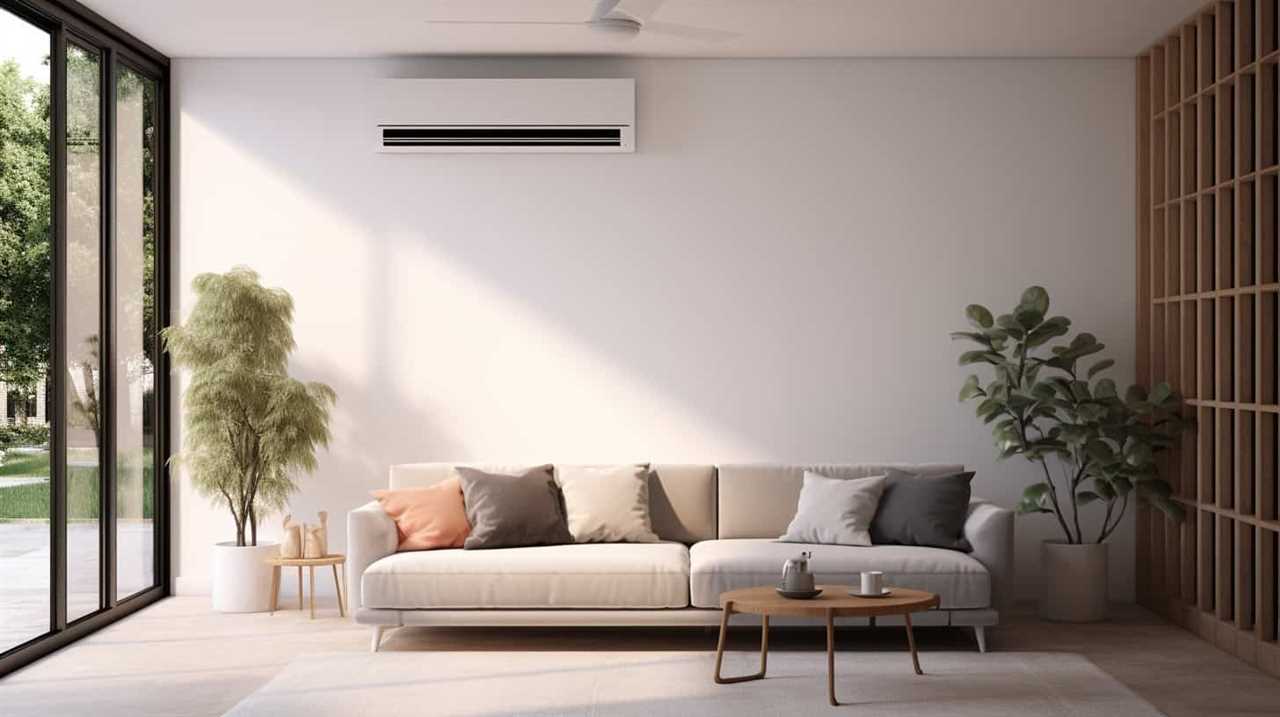
It is crucial to regularly inspect and maintain the heat pump system to detect and address refrigerant leaks promptly. By doing so, you can ensure the system operates efficiently and prevent potential damage.
Prevention and Repair
To effectively prevent and repair refrigerant leaks in heat pump systems, it’s important to identify common sources of leaks.
One common source is corrosion within the system. Corrosion can occur due to exposure to moisture or chemicals, leading to small holes or cracks in the refrigerant lines. Regular inspection and maintenance can help prevent corrosion by identifying and addressing any signs of rust or deterioration.
Another common cause of leaks is suboptimal refrigerant flow. This can result from issues such as improper charging, clogged filters, or restricted airflow. To optimize refrigerant flow and prevent leaks, it’s essential to ensure proper installation, regular filter cleaning or replacement, and adequate airflow throughout the system.
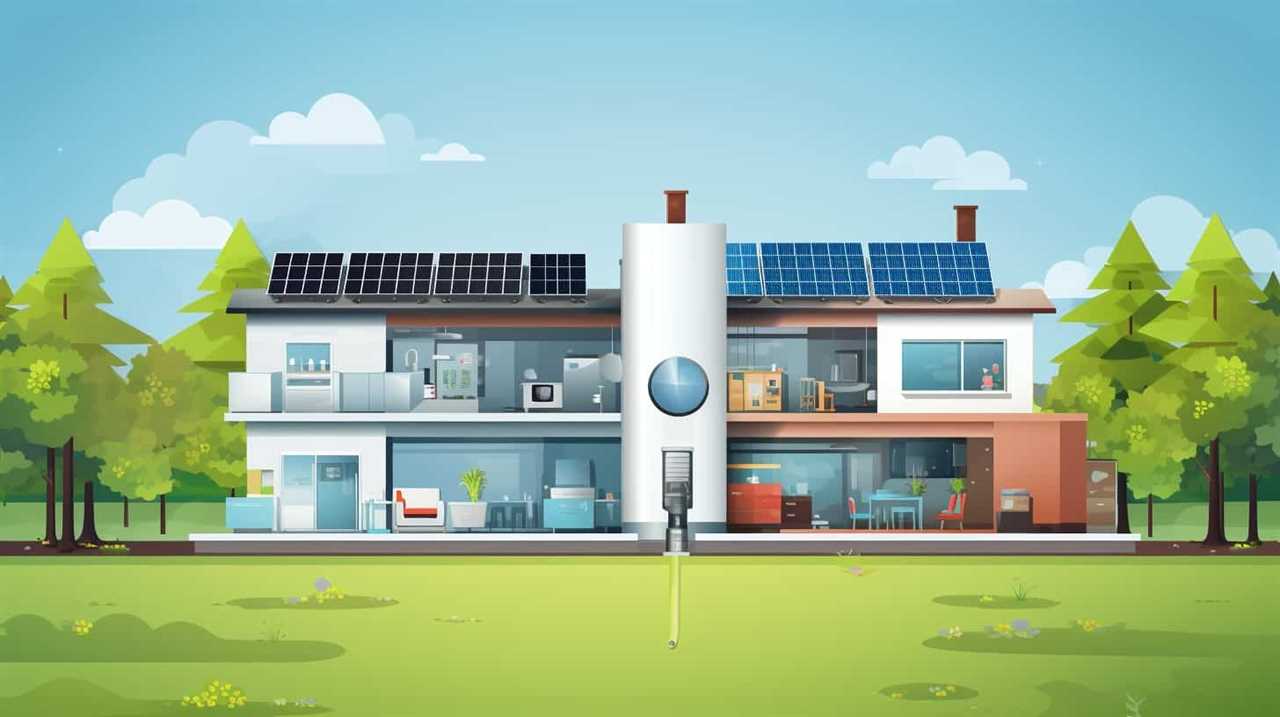
Troubleshooting Low Refrigerant Pressure in Heat Pumps
When troubleshooting low refrigerant pressure in heat pumps, it’s important to understand the causes, the impact on the heat pump, and the steps to resolve the issue.
Low refrigerant pressure can be caused by leaks, improper charging, or a faulty expansion valve.
This can result in reduced cooling or heating capacity and decreased efficiency.
To troubleshoot, one should inspect for leaks, check the refrigerant charge, and evaluate the expansion valve functionality.

Causes of Low Pressure
One common cause of low pressure in heat pumps is a refrigerant leak. When a refrigerant leak occurs, the amount of refrigerant in the system decreases, leading to inadequate cooling. Troubleshooting low pressure sensors can help identify the cause of the low pressure.
Here are four possible causes of low pressure in heat pumps:
-
Refrigerant leak: A leak in the refrigerant lines can result in a loss of refrigerant, causing low pressure in the system.
-
Faulty expansion valve: If the expansion valve isn’t functioning properly, it may restrict the flow of refrigerant, leading to low pressure.
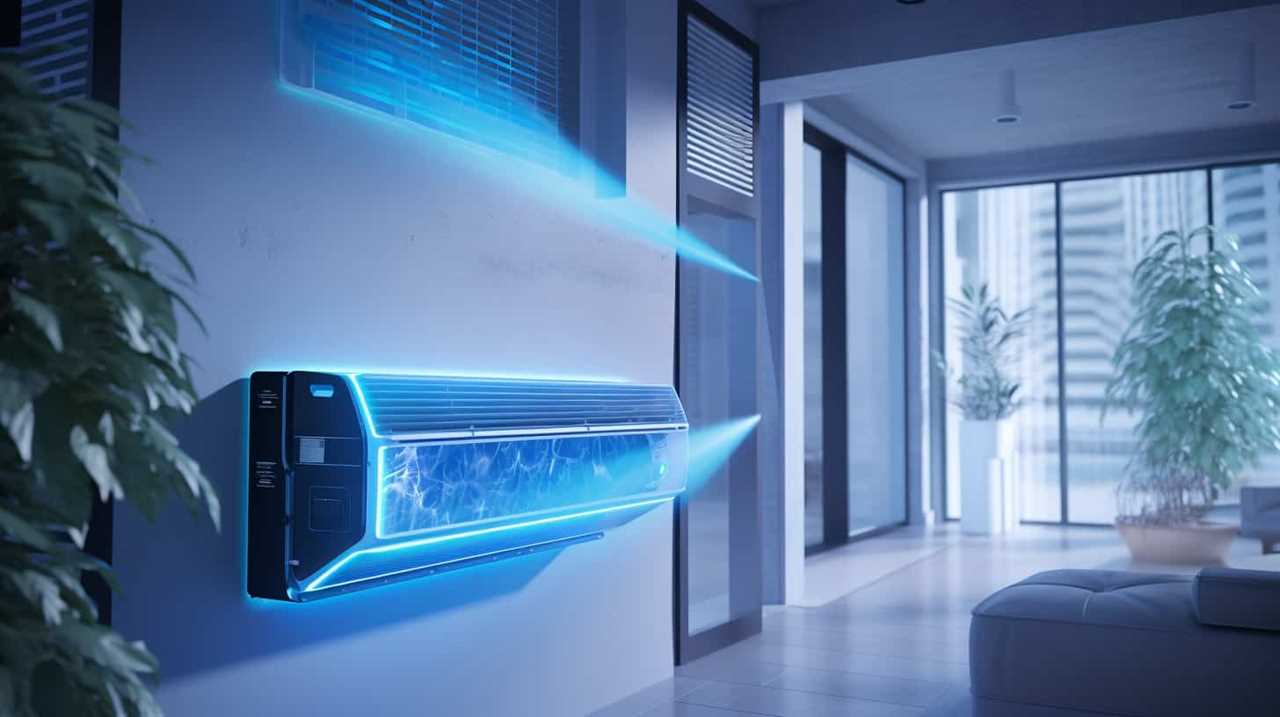
-
Blocked or restricted refrigerant lines: Obstructions in the refrigerant lines can impede the flow of refrigerant, causing low pressure in the system.
-
Faulty compressor: A malfunctioning compressor may not be able to maintain the required pressure levels, resulting in low pressure in the heat pump system.
Understanding these causes can help technicians diagnose and address low pressure issues efficiently.
Now, let’s explore the impact of low pressure on the heat pump.
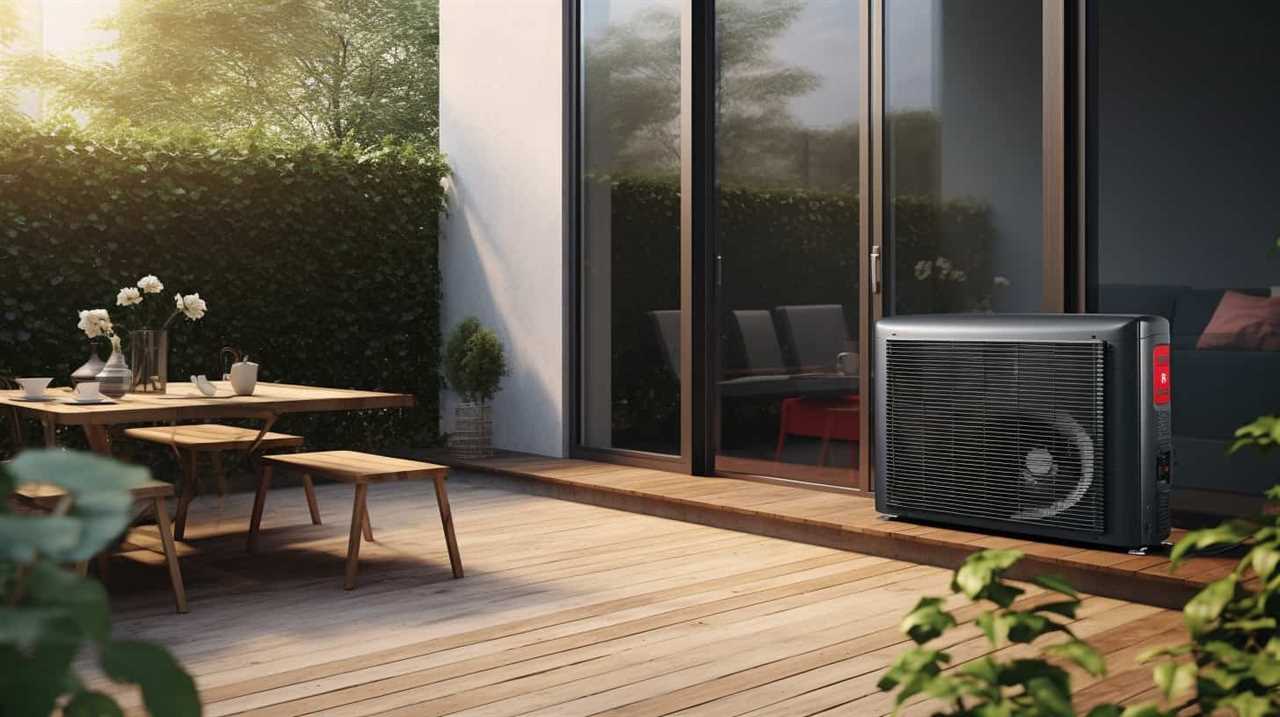
Impact on Heat Pump
We can troubleshoot low refrigerant pressure in heat pumps to determine its impact on the functioning of the heat pump. Low refrigerant pressure can have a significant effect on heat pump efficiency and performance.
When the refrigerant pressure is low, the heat pump may struggle to transfer heat effectively, resulting in reduced heating or cooling capacity. This can lead to longer running times and higher energy consumption, ultimately reducing the overall efficiency of the heat pump.
In addition, low refrigerant pressure can cause the heat pump to operate at higher temperatures, increasing the risk of component failure and potentially leading to costly repairs.
Therefore, it’s crucial to address low refrigerant pressure promptly to maintain optimal heat pump performance and efficiency. To troubleshoot this issue, we can follow specific steps to identify and resolve the root cause of the problem.
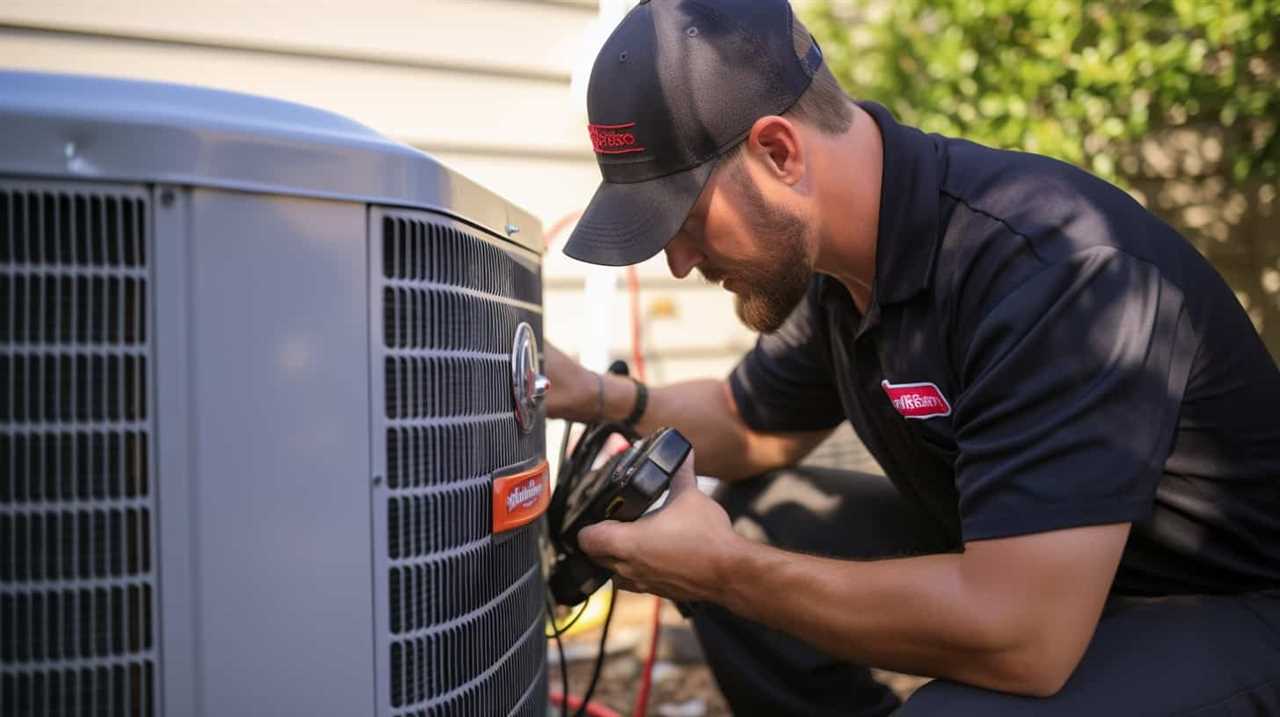
Troubleshooting Steps
By checking for potential leaks and measuring refrigerant levels, we can effectively troubleshoot low refrigerant pressure in heat pumps. Here are some troubleshooting techniques for diagnosing system malfunctions:
-
Conduct a visual inspection: Inspect the heat pump for any signs of refrigerant leaks, such as oil stains or frost accumulation. These can indicate a potential leak that may be causing low refrigerant pressure.
-
Check the refrigerant levels: Use a pressure gauge to measure the refrigerant pressure in the heat pump. If the pressure is below the recommended level, it indicates a low refrigerant charge.
-
Perform a leak test: Use a refrigerant leak detector to identify any leaks in the system. This will help pinpoint the source of the low refrigerant pressure.
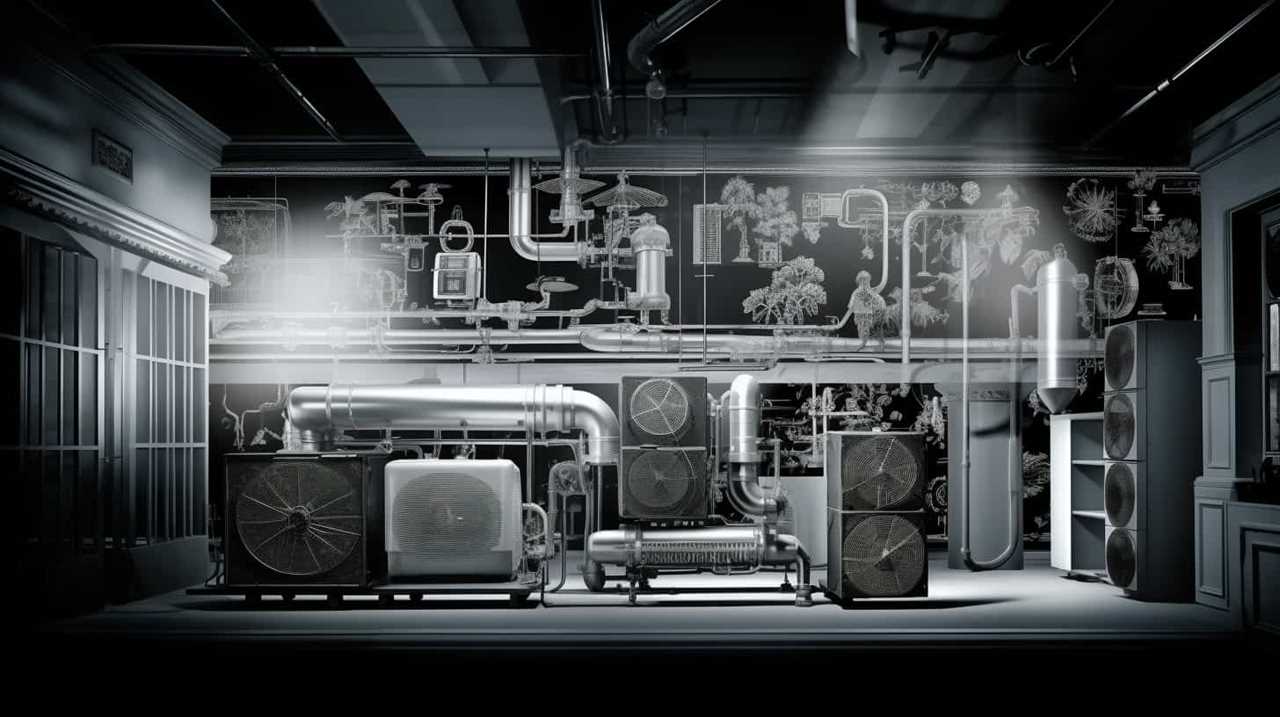
-
Repair the leaks and recharge the system: Once the leaks are identified, they should be repaired promptly. Afterward, the system can be recharged with the appropriate amount of refrigerant to restore the proper pressure.
By following these troubleshooting steps, we can diagnose and resolve low refrigerant pressure issues in heat pumps. This will ensure optimal performance and efficiency of the system.
In the next section, we’ll discuss resolving issues with heat pump compressors in the refrigeration cycle.
Resolving Issues With Heat Pump Compressors in the Refrigeration Cycle
When troubleshooting heat pump compressors in the refrigeration cycle, it is important to identify and address any issues promptly to ensure optimal performance. Compressor maintenance plays a crucial role in the smooth functioning of the heat pump system. Common issues with heat pump compressors include electrical problems, refrigerant leaks, and mechanical failures. By conducting regular inspections and performing routine maintenance, these problems can be minimized. It is essential to check the electrical connections, clean the condenser coils, and ensure proper lubrication of the compressor. Additionally, troubleshooting the refrigeration cycle involves checking for any refrigerant leaks, adjusting the refrigerant charge, and inspecting the expansion valve. By addressing these issues promptly and following proper maintenance procedures, we can ensure the longevity and efficiency of the heat pump compressor.
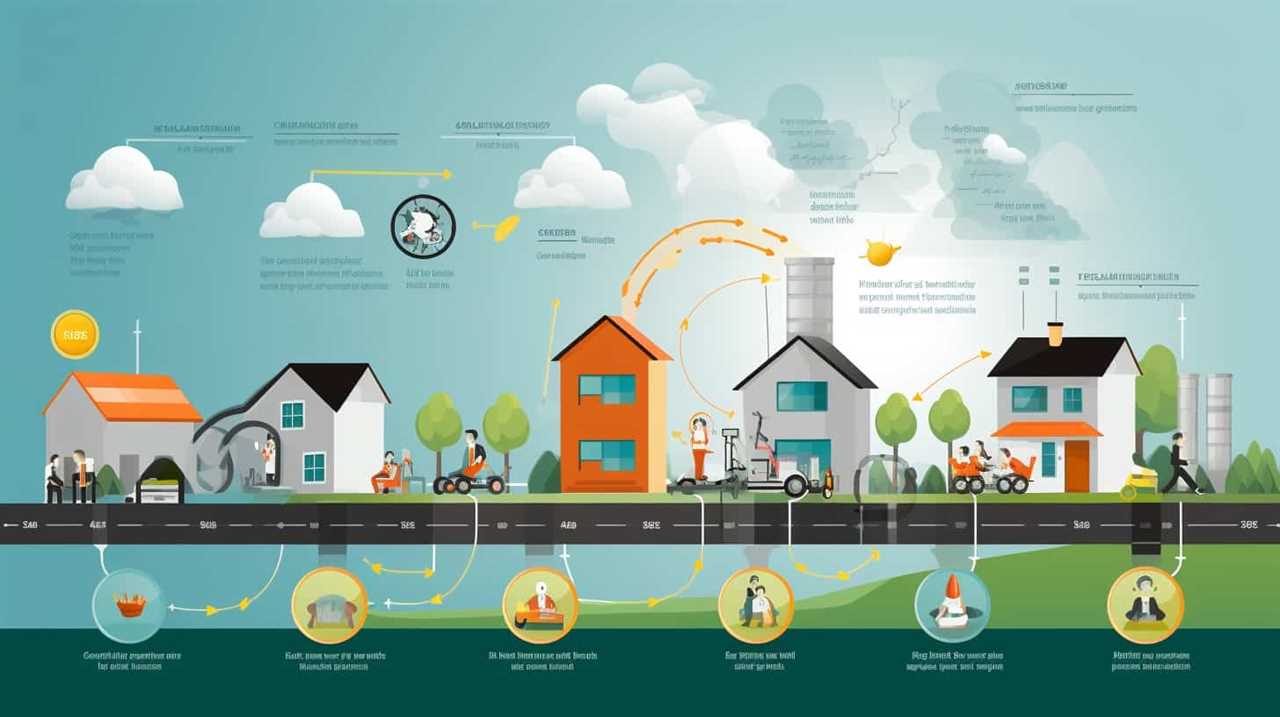
| Common Compressor Issues | Causes | Solutions |
|---|---|---|
| Electrical problems | Loose connections or faulty wiring | Check and tighten electrical connections |
| Refrigerant leaks | Aging or damaged components | Repair or replace damaged components |
| Mechanical failures | Wear and tear or lack of lubrication | Lubricate the compressor and replace worn-out parts |
Note: Proper training and expertise are essential when performing compressor maintenance and troubleshooting.
Fixing Refrigeration Cycle Obstructions and Blockages in Heat Pumps
To address refrigeration cycle obstructions and blockages in heat pumps, we must identify and remove any barriers that impede the flow of refrigerant. By conducting regular refrigeration cycle maintenance, we can ensure optimal heat pump performance and prevent any potential issues.
Here are four key steps to fix refrigeration cycle obstructions and blockages:
-
Inspect the refrigerant lines for any physical obstructions such as debris or ice buildup. Clear any blockages to allow smooth refrigerant flow.
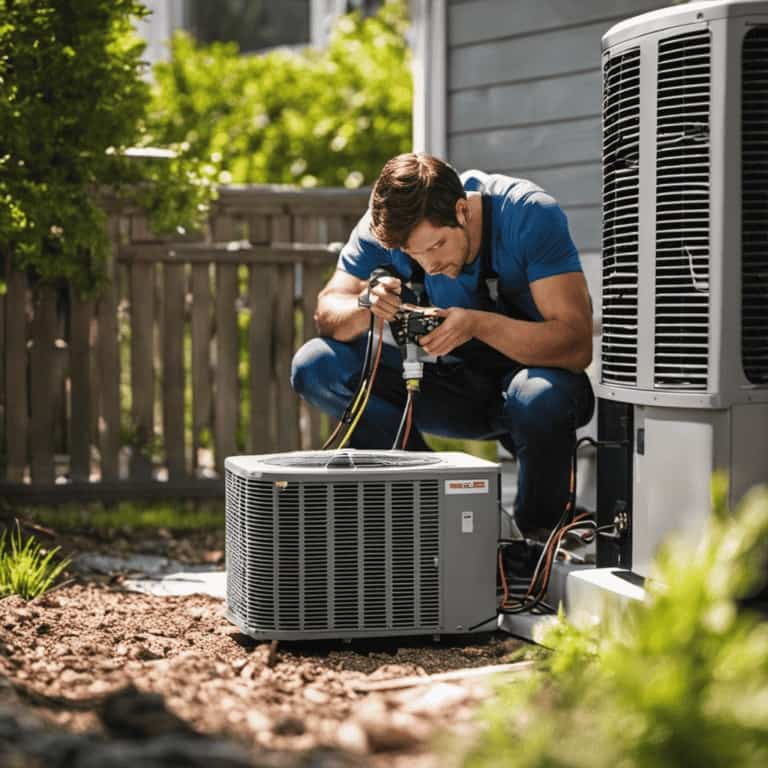
-
Check the expansion valve for any clogs or restrictions. Clean or replace the valve if necessary to ensure proper refrigerant expansion.
-
Verify that the filter drier is clean and functioning correctly. Replace it if it’s clogged or damaged to prevent any refrigerant flow restrictions.
-
Examine the evaporator coil for dirt or debris accumulation. Clean the coil to improve heat transfer and maintain efficient refrigerant flow.
Preventing and Addressing Refrigerant Contamination in Heat Pump Systems
How can we prevent and address refrigerant contamination in heat pump systems?

Proper refrigerant management and heat pump maintenance are essential in preventing and addressing refrigerant contamination. Regular inspections and maintenance of heat pump systems can help identify any leaks or potential sources of contamination. It’s important to ensure that all connections and fittings are tight and secure to prevent refrigerant leaks.
Additionally, regular refrigerant testing and analysis can help detect any contaminants present in the system. If contamination is found, it’s crucial to promptly address the issue by removing the contaminated refrigerant, thoroughly cleaning the system, and replacing the refrigerant with a clean and appropriate type.
Proper training and education for technicians on refrigerant management practices can also aid in preventing and addressing refrigerant contamination in heat pump systems.
Frequently Asked Questions
How Often Should I Have My Heat Pump Refrigerant Levels Checked and Serviced?
We regularly check and service heat pump refrigerant levels to ensure optimal performance. It’s important because different heat pump refrigerant types require specific levels for efficient operation. Regular maintenance helps prevent issues and extends the lifespan of your heat pump.

What Are the Signs of a Refrigerant Leak in a Heat Pump System?
When it comes to common heat pump refrigeration cycle issues, it’s important to know the signs of a refrigerant leak. By following troubleshooting steps, we can identify and address the problem efficiently.
Can Low Refrigerant Pressure in a Heat Pump Cause Damage to Other Components?
Yes, low refrigerant pressure in a heat pump can cause damage to other components. It can lead to inefficient operation and reduced cooling or heating capacity, impacting overall system efficiency and performance.
Are There Any Specific Maintenance Tasks I Can Perform to Prevent Issues With the Heat Pump Compressor?
Preventive maintenance is crucial for avoiding issues with the heat pump compressor. Regularly cleaning the coils, checking refrigerant levels, and ensuring proper airflow can help troubleshoot any potential compressor problems.
How Can I Prevent Refrigerant Contamination in My Heat Pump System?
To prevent refrigerant contamination in our heat pump system, we can implement regular maintenance tasks such as checking for leaks, ensuring proper refrigerant levels, and cleaning or replacing filters. This optimizes the efficiency of our heat pump system.
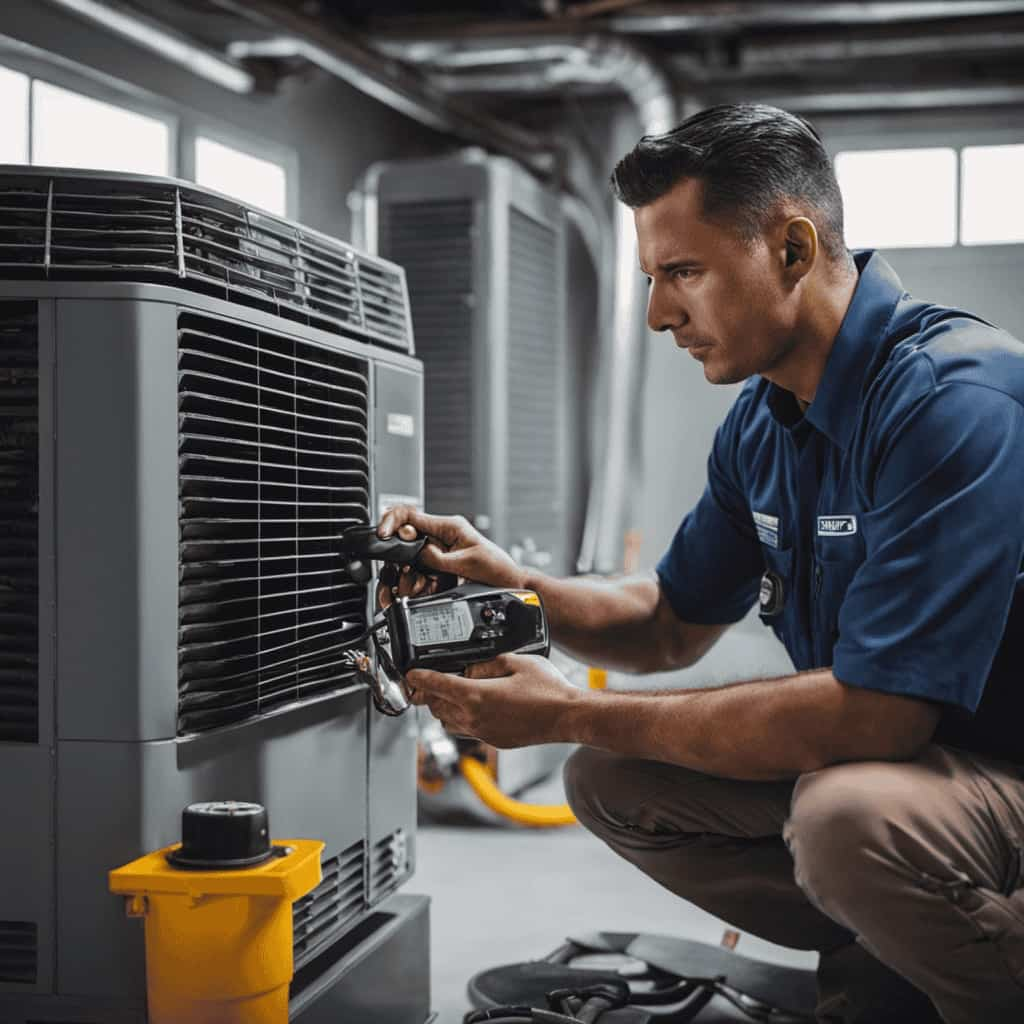
Conclusion
In conclusion, understanding and troubleshooting common refrigeration cycle issues in heat pump systems is crucial for optimal performance.
Just like a well-oiled machine, a heat pump relies on a smooth and efficient refrigeration cycle to provide reliable heating and cooling.
By addressing refrigerant leaks, low pressure, compressor problems, obstructions, and contamination, we can ensure that our heat pumps continue to function effectively, keeping our spaces comfortable and energy-efficient.
Remember, a well-maintained refrigeration cycle is the key to a well-functioning heat pump.


Refrigeration Cycle
Understanding the Importance of Heat Pump Maintenance

We have all experienced the frustration of a malfunctioning heat pump on a chilly winter day. It can leave us feeling like we are literally out in the cold. This is why it is crucial to understand the importance of regular maintenance for your heat pump.
Regular upkeep ensures optimal performance and extends the lifespan of your heat pump. From cleaning filters to troubleshooting issues, we’ll guide you through the ins and outs of maintaining this vital home appliance.
Don’t let your comfort be compromised – let’s dive into the world of heat pump maintenance together.
Key Takeaways
- Regular maintenance is crucial for optimal performance and extended lifespan of heat pumps.
- Professional maintenance services are recommended for thorough inspection and servicing.
- Regular maintenance helps ensure optimal energy efficiency and reduces energy consumption.
- Scheduling regular maintenance prevents minor issues from becoming major problems and saves on costly repairs.
The Basics of Heat Pump Maintenance
Now let’s talk about the basics of heat pump maintenance.

Regular maintenance is of utmost importance when it comes to ensuring the optimal performance and longevity of your heat pump system. By regularly maintaining your heat pump, you can prevent potential breakdowns, reduce energy consumption, and save on costly repairs in the long run.
While there are some maintenance tasks that you can perform yourself, such as cleaning or replacing air filters, it’s highly recommended to seek professional maintenance services. Professional technicians have the expertise and knowledge to thoroughly inspect and service your heat pump, identifying any underlying issues and addressing them promptly.
The benefits of professional maintenance services include improved energy efficiency, extended equipment lifespan, enhanced indoor air quality, and peace of mind knowing that your heat pump is operating at its best.
Why Regular Maintenance Is Essential for Heat Pumps
Regular maintenance is essential for heat pumps for two main reasons:
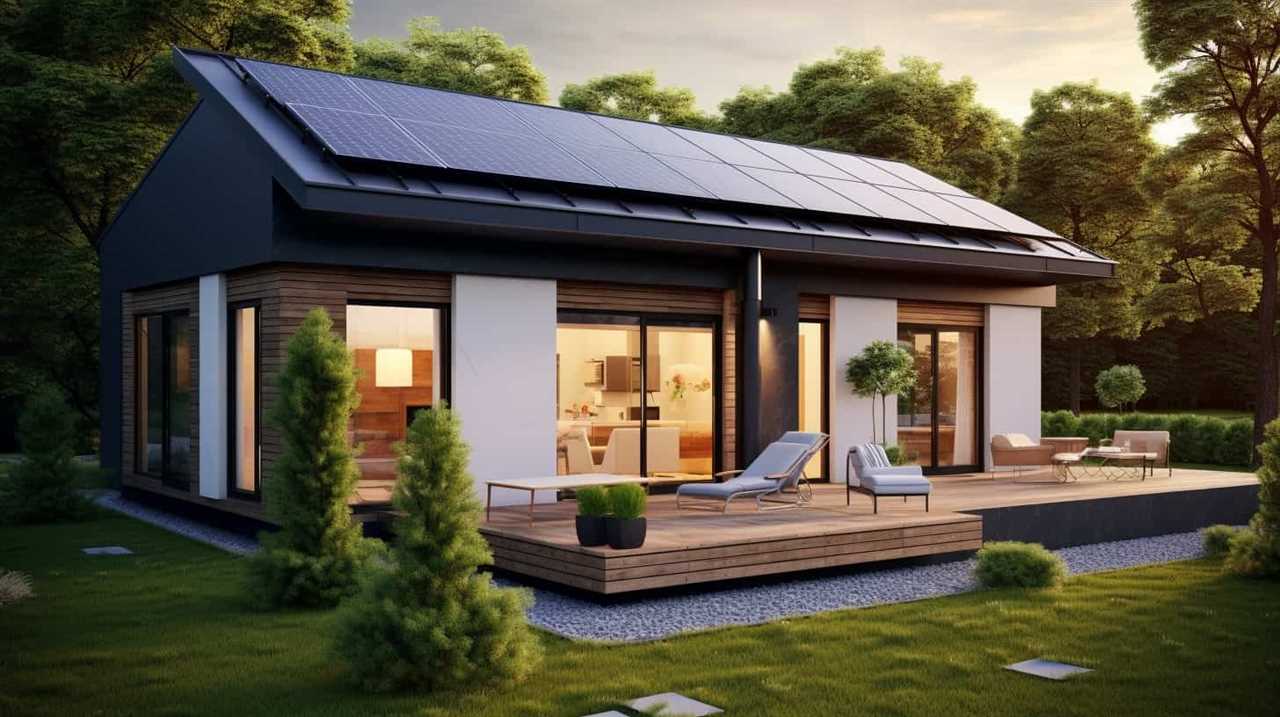
-
Prolonging the lifespan of the equipment and ensuring optimal energy efficiency. By scheduling regular maintenance, we can identify and address any potential issues before they become major problems, ultimately extending the life of the heat pump.
-
Regular maintenance helps to keep the heat pump running at peak performance, maximizing energy efficiency and reducing energy consumption.
Prolonging Heat Pump Lifespan
To ensure optimal performance and extend the lifespan of our heat pumps, it is crucial that we regularly maintain them. By conducting regular maintenance, we can reap numerous benefits such as reducing energy consumption, improving indoor air quality, and preventing costly repairs. Let’s take a look at the specific ways in which regular maintenance can help in extending the lifespan of our heat pumps:
| Maintenance Task | Benefits |
|---|---|
| Cleaning the filters | Improves airflow |
| Inspecting the coils | Enhances heat transfer |
| Checking refrigerant | Maintains efficiency |
Cleaning the filters regularly ensures that dust and debris do not accumulate, enabling proper airflow and preventing strain on the system. Inspecting the coils helps to remove any dirt or debris, which can hinder heat transfer and decrease efficiency. Lastly, checking the refrigerant levels ensures that the system is operating at its optimal level.

Ensuring Optimal Energy Efficiency
We can maximize energy efficiency by regularly maintaining our heat pumps and ensuring that they operate at their optimal level. Regular maintenance of heat pumps is essential for reducing energy consumption and maximizing efficiency.
When heat pumps aren’t properly maintained, they can become less efficient and consume more energy than necessary. This can lead to higher energy bills and a negative impact on the environment.
By scheduling regular maintenance, such as cleaning or replacing air filters, checking refrigerant levels, and inspecting electrical connections, we can ensure that our heat pumps are operating at their peak efficiency.
Additionally, regular maintenance allows for the early detection and repair of any potential issues, preventing them from developing into major problems that could lead to decreased energy efficiency.
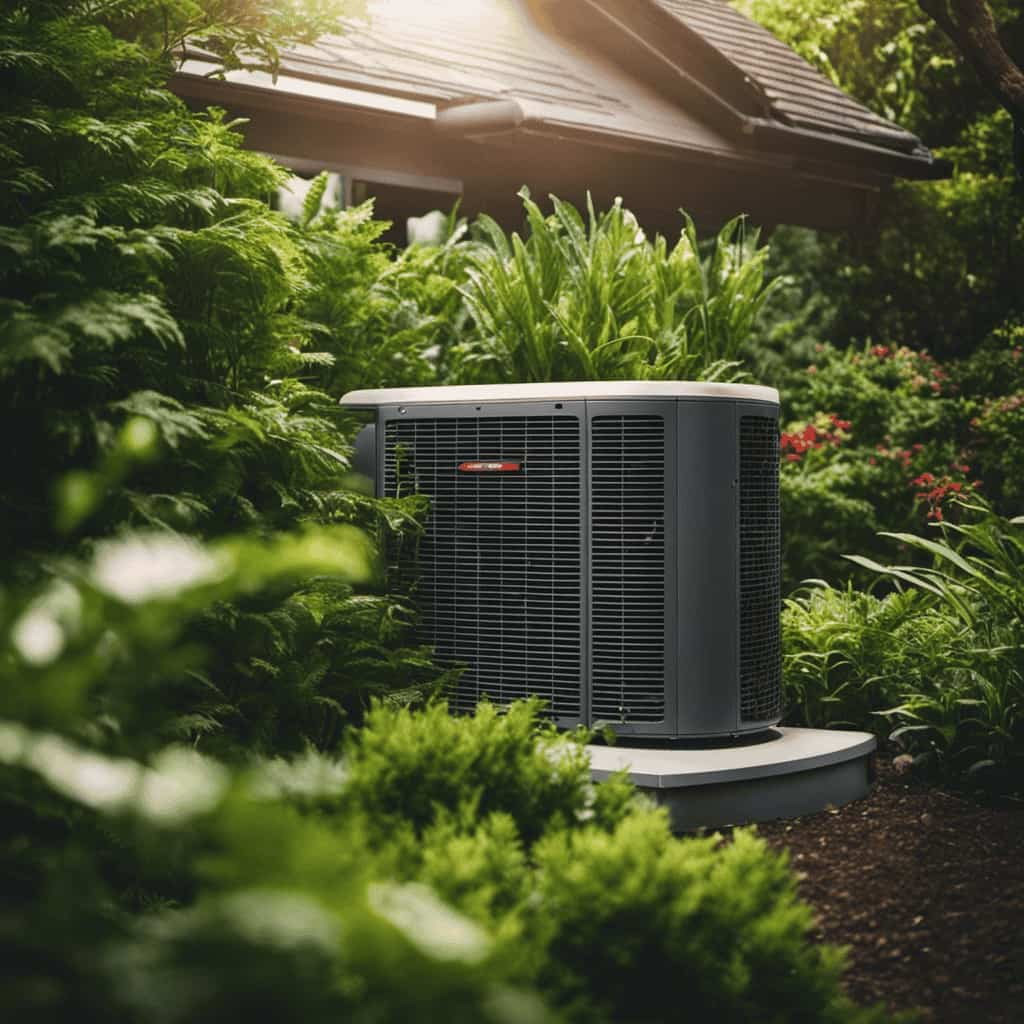
Taking the time to maintain our heat pumps not only saves us money but also helps to reduce our overall energy consumption.
Understanding the Refrigeration Cycle in Heat Pumps
Let’s delve into the refrigeration cycle in heat pumps to gain a clearer understanding of its inner workings. Understanding the refrigeration cycle is crucial for effective heat pump troubleshooting and maintenance.
Here are the four main components of the refrigeration cycle:
-
Evaporator: This component absorbs heat from the surrounding air or water and converts it into a gaseous state.
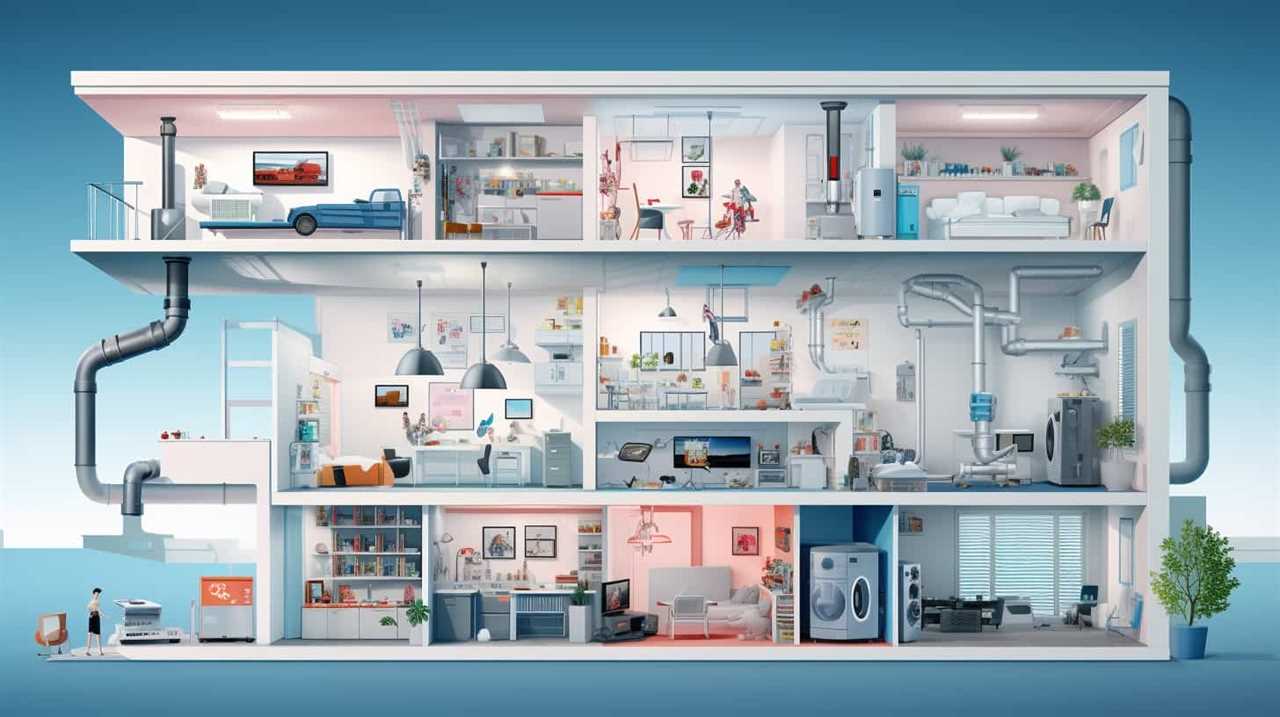
-
Compressor: The compressor then increases the pressure and temperature of the refrigerant gas, making it ready for the next stage.
-
Condenser: The hot refrigerant gas flows into the condenser, where it releases heat to the outside environment and condenses back into a liquid state.
-
Expansion Valve: The expansion valve regulates the flow of the refrigerant into the evaporator, allowing it to expand and absorb heat again.
Understanding these refrigeration cycle components will help you identify potential issues and ensure the smooth operation of your heat pump.
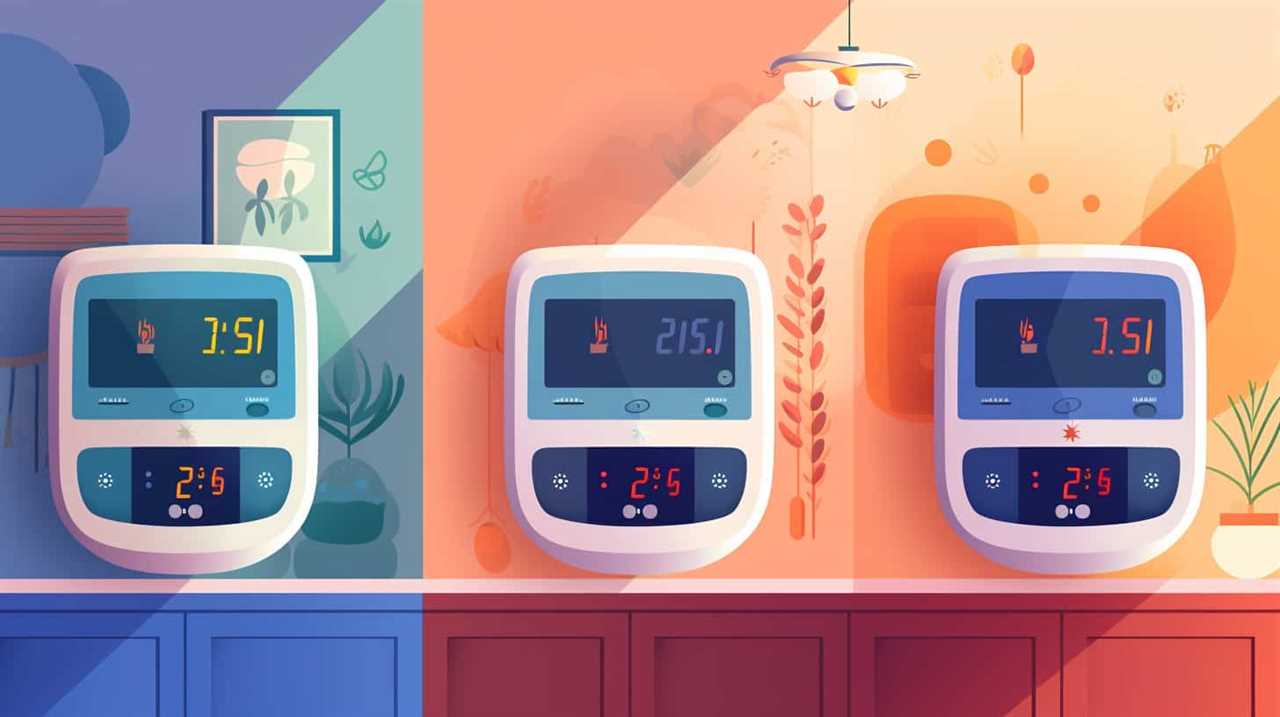
Signs That Your Heat Pump Needs Maintenance
If we notice a decrease in heating or cooling efficiency, it may be a sign that our heat pump needs maintenance. Regular maintenance benefits our heat pump by ensuring it operates at peak performance and extends its lifespan.
Signs of wear and tear can manifest in various ways. One common sign is a decrease in the temperature differential between the supply and return air. This indicates that the heat pump is struggling to transfer heat effectively.
Another sign is an increase in noise levels, which could indicate issues with the fan or compressor. Additionally, if we notice a sudden increase in energy consumption, it could be a sign that our heat pump is working harder than necessary due to underlying issues.
Regular maintenance can help identify and address these signs before they escalate into larger and costlier problems.

The Importance of Cleaning and Changing Filters
Regularly cleaning and changing filters is essential for maintaining the efficiency and performance of our heat pump. Here are four reasons why this task is of utmost importance:
-
Improved Air Quality: Clean filters prevent dust, dirt, and allergens from circulating in our indoor air, ensuring a healthier living environment for us and our loved ones.
-
Energy Efficiency: When filters are clogged with debris, the heat pump has to work harder to push air through, resulting in increased energy consumption and higher utility bills. Regularly cleaning or replacing filters helps maintain optimal airflow and energy efficiency.
-
Extended Lifespan: A clean filter reduces strain on the heat pump’s components, allowing it to operate smoothly. By regularly cleaning or replacing filters, we can extend the lifespan of our heat pump and avoid costly repairs or premature replacements.
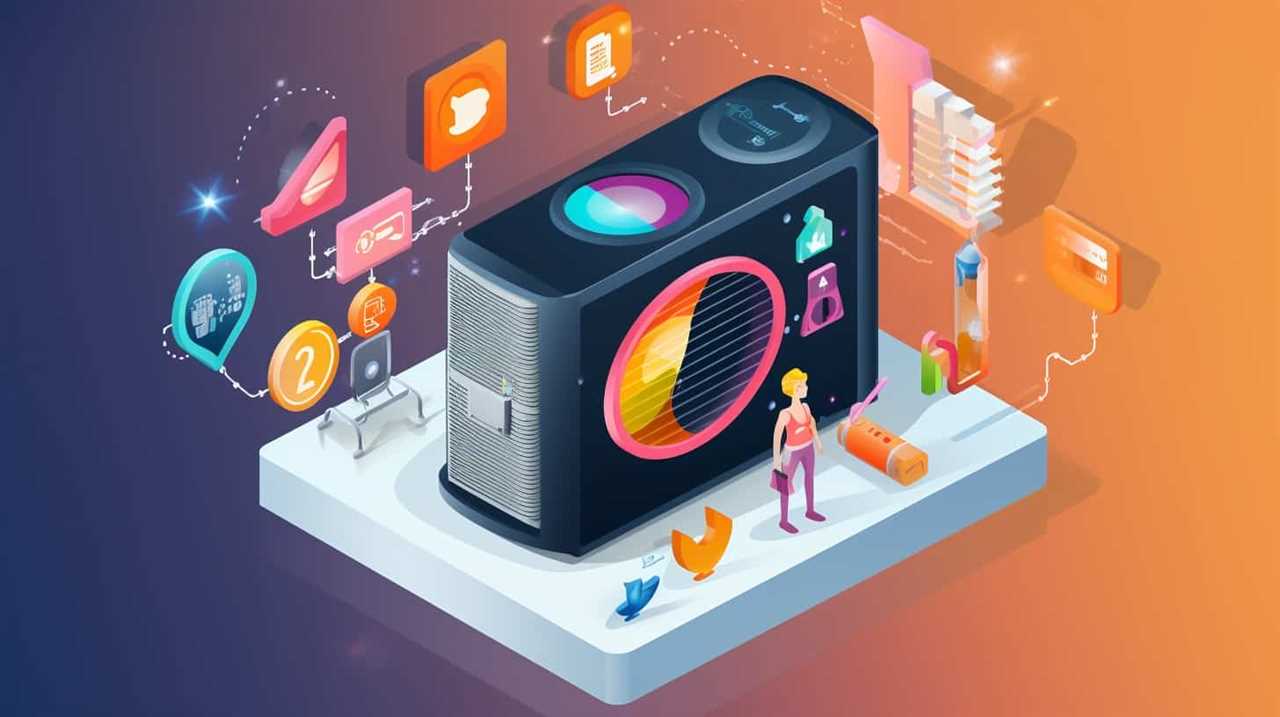
-
Maximized Performance: High-quality filters are designed to effectively trap particles while allowing sufficient airflow. By using high-quality filters, we can ensure that our heat pump operates at its maximum performance, providing us with consistent heating and cooling.
Regularly cleaning and changing filters is a simple yet crucial maintenance task that contributes to the overall efficiency, longevity, and performance of our heat pump.
Tips for Proper Lubrication and Belt Maintenance
For optimal performance and longevity of our heat pump, we should prioritize proper lubrication and belt maintenance. Regular lubrication of the heat pump’s moving parts is essential to reduce friction and prevent wear and tear. It is important to use the correct lubrication technique for each component, as specified by the manufacturer. The table below provides a quick reference guide for the lubrication techniques of common heat pump components:
| Component | Lubrication Technique |
|---|---|
| Fan motor bearings | Apply lubricating oil |
| Blower motor bearings | Apply lubricating oil |
| Compressor | Use compressor oil |
| Drive shaft | Apply high-temperature grease |
| Pulleys and belts | Use belt dressing |
In addition to lubrication, proper belt tensioning is crucial for efficient heat pump operation. Incorrect belt tension can lead to slippage, reduced performance, and premature belt failure. Belt tension should be checked regularly and adjusted using the appropriate belt tensioning methods recommended by the manufacturer. By following these maintenance tips, we can ensure that our heat pump operates at its best. Now, let’s move on to discussing common issues with the heat pump refrigeration cycle.
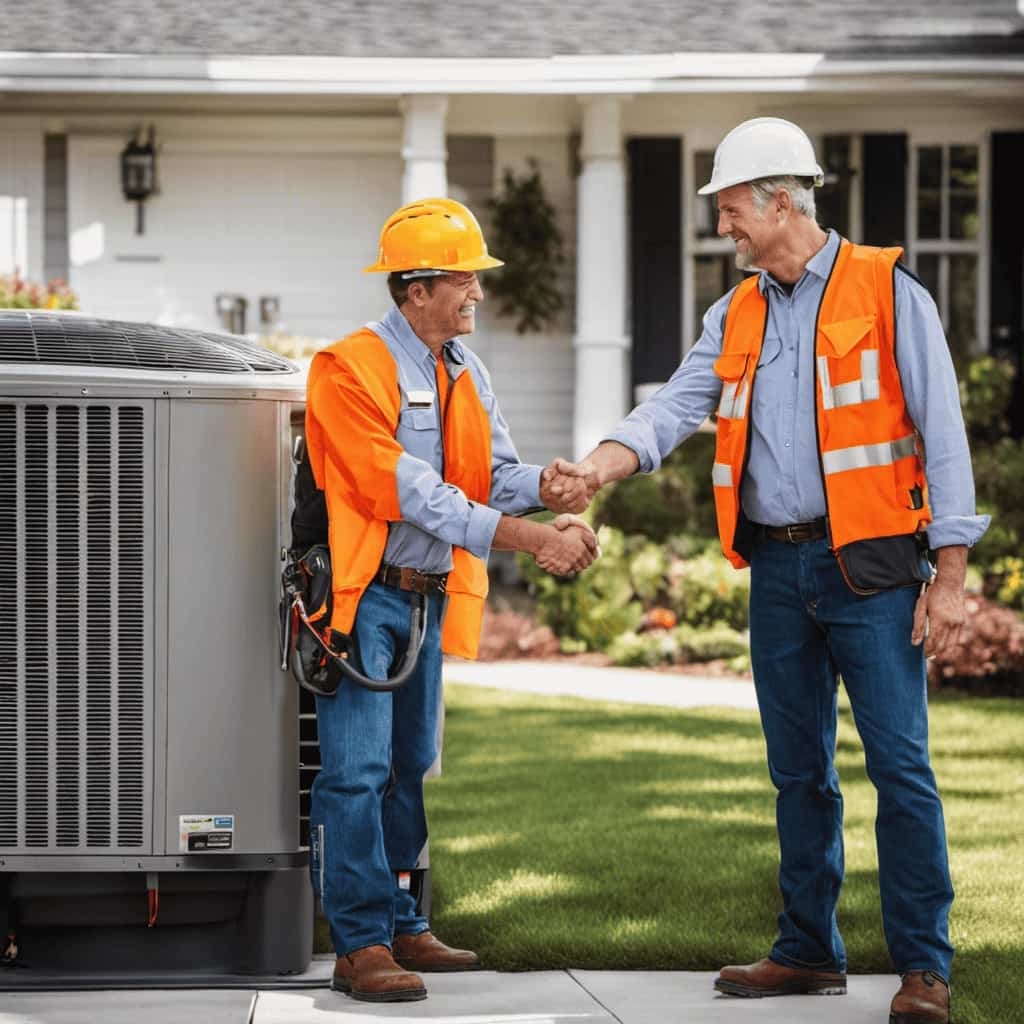
SUBSEQUENT SECTION: ‘Common Issues with Heat Pump Refrigeration Cycle’
Common Issues With Heat Pump Refrigeration Cycle
Three common issues can arise with the heat pump refrigeration cycle, and addressing them promptly is essential for optimal performance and energy efficiency. Here are four common problems to be aware of:
-
Troubleshooting refrigerant leaks: Refrigerant leaks can occur due to corrosion, faulty connections, or punctures in the refrigerant lines. Detecting and repairing leaks is crucial as they can lead to reduced cooling or heating capacity and increased energy consumption.
-
Troubleshooting compressor issues: The compressor is a vital component of the heat pump refrigeration cycle. Issues such as motor failure, electrical problems, or refrigerant flooding can compromise its performance. Timely diagnosis and repair of compressor issues are crucial for maintaining efficient operation.
-
Inadequate refrigerant charge: An improper refrigerant charge can result in reduced efficiency and performance. It can be caused by leaks or improper installation. Regular inspections and maintenance can help identify and rectify this issue.
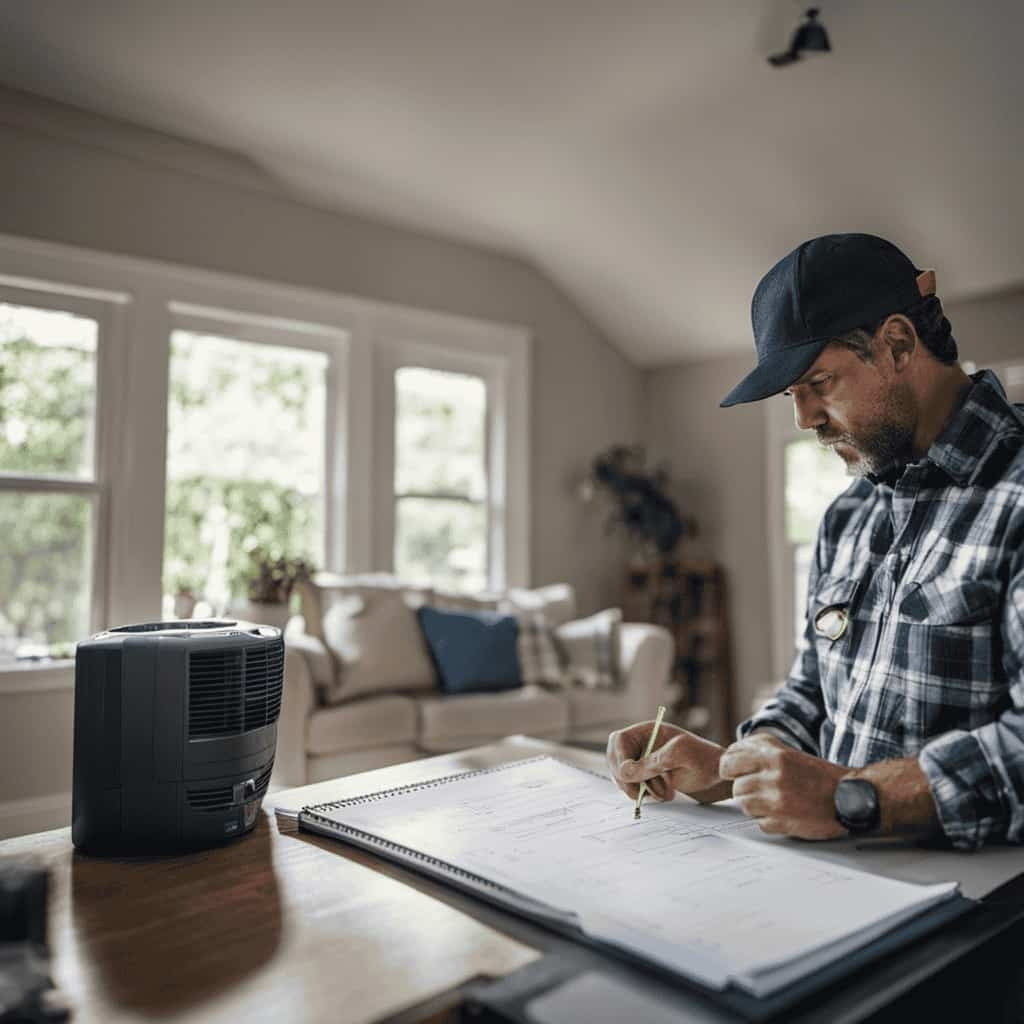
-
Reversing valve malfunctions: The reversing valve allows the heat pump to switch between heating and cooling modes. If it becomes stuck or fails to function correctly, the heat pump may not be able to provide the desired temperature control.
Understanding these common issues with the heat pump refrigeration cycle is important for ensuring optimal performance. In the next section, we’ll discuss how to troubleshoot and diagnose heat pump problems to address these issues effectively.
How to Troubleshoot and Diagnose Heat Pump Problems
Now let’s turn our attention to the common issues that can arise with heat pumps and how to troubleshoot them. By understanding these common problems and learning how to diagnose them, you can save time and money on costly repairs.
In this section, we’ll discuss the troubleshooting process for heat pumps, providing you with the knowledge and skills to effectively identify and resolve any issues that may arise.
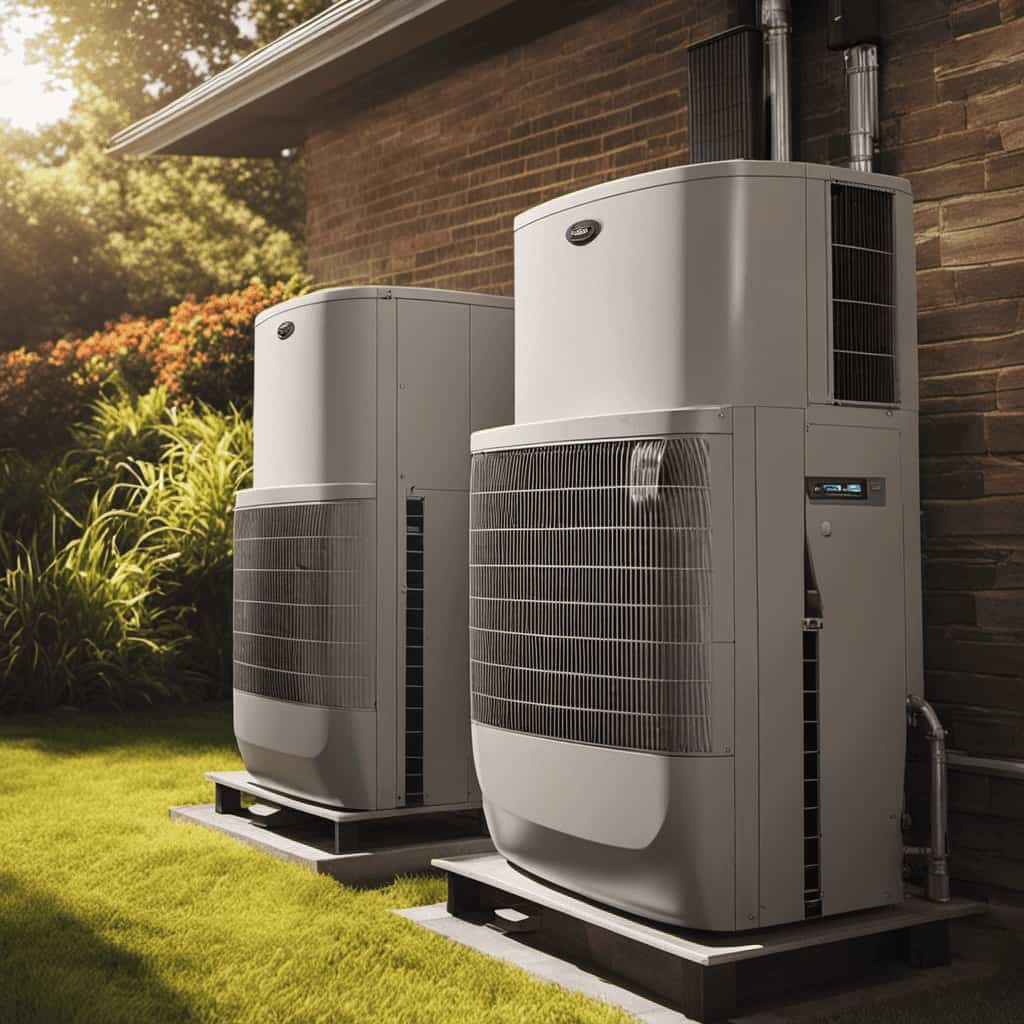
Common Heat Pump Issues
We often encounter various issues with heat pumps, and it’s essential to troubleshoot and diagnose these problems accurately. Here are four common heat pump issues that homeowners may experience:
-
Refrigerant Leak: A refrigerant leak can lead to reduced cooling or heating capacity. Signs include hissing sounds, ice formation, or a drop in performance. A professional technician can locate and repair the leak while ensuring proper refrigerant levels.
-
Electrical Problems: Faulty wiring, blown fuses, or tripped breakers can cause the heat pump to malfunction. It’s important to check the electrical connections and circuit breakers for any issues. If necessary, a qualified electrician should be called to address these problems.
-
Frozen Coils: If the heat pump coils freeze, it can lead to poor performance or a complete system shutdown. This can be caused by issues such as airflow restrictions, dirty air filters, or low refrigerant levels. Regularly cleaning and maintaining the system can help prevent frozen coils.

-
Thermostat Malfunction: A malfunctioning thermostat can lead to inconsistent temperature control or the heat pump not turning on/off as desired. Checking the thermostat settings, replacing batteries if needed, or recalibrating the thermostat can help resolve these issues.
Troubleshooting Heat Pump
First, let’s discuss two common troubleshooting steps that can help diagnose heat pump problems. When troubleshooting a heat pump, it’s important to start with the basics.
Firstly, check the thermostat settings to ensure they’re correctly programmed. Incorrect settings can lead to the heat pump not working as desired.
Secondly, inspect the air filters to see if they’re dirty or clogged. Dirty filters can restrict airflow, causing the heat pump to work harder and less efficiently.

These two steps can often resolve common heat pump issues and prevent unnecessary repairs. However, if the problem persists, it’s recommended to contact a professional technician who can further diagnose and troubleshoot the heat pump system.
Scheduling Professional Maintenance for Optimal Performance
To ensure optimal performance, we recommend scheduling professional maintenance for your heat pump at least once a year. Regular maintenance is essential for preventing heat pump breakdowns and maximizing its lifespan.
Here are the benefits of professional maintenance:
-
Improved Efficiency: A well-maintained heat pump operates more efficiently, reducing energy consumption and lowering your utility bills.
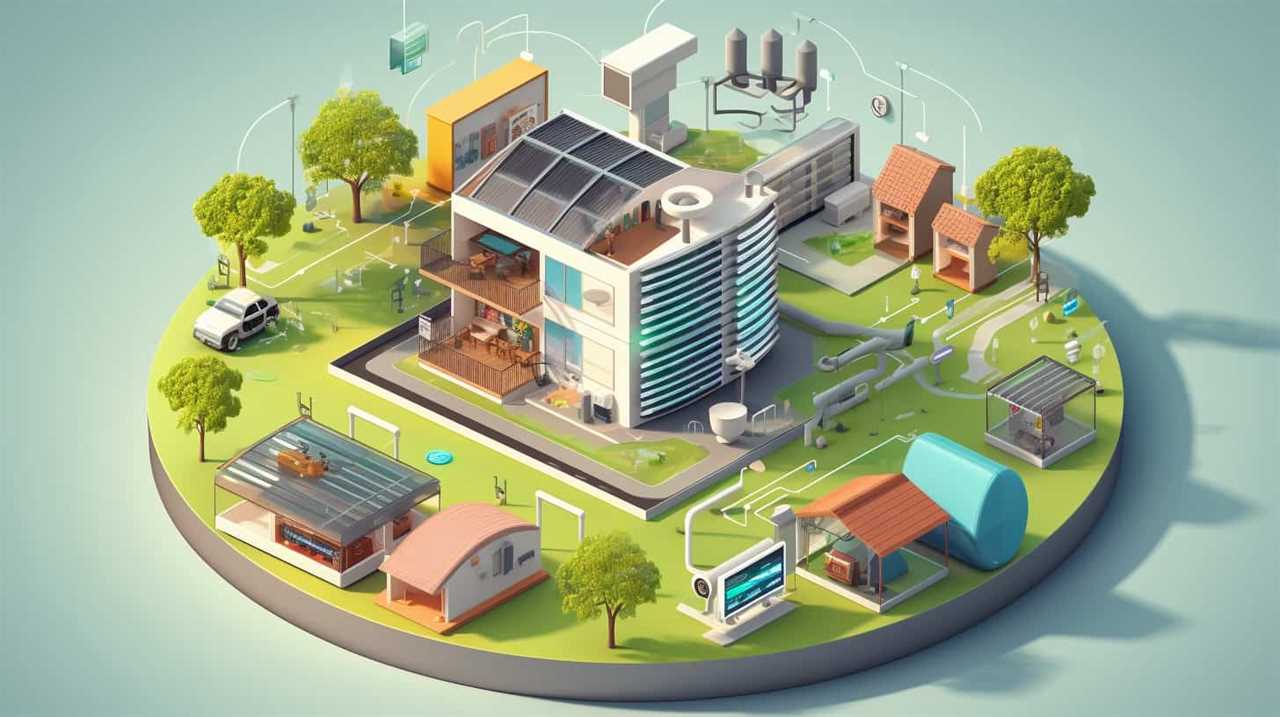
-
Enhanced Comfort: Regular maintenance ensures that your heat pump is delivering the desired heating and cooling capacity, keeping you comfortable throughout the year.
-
Extended Lifespan: Professional maintenance helps identify and address minor issues before they escalate, prolonging the life of your heat pump and delaying the need for costly replacements.
-
Warranty Compliance: Many manufacturers require annual professional maintenance to maintain the warranty coverage for your heat pump. Regular servicing ensures that you’re in compliance with these requirements.
Frequently Asked Questions
How Often Should I Schedule Professional Maintenance for My Heat Pump?
We schedule professional maintenance for our heat pump regularly to ensure optimal performance. The frequency of scheduling depends on factors like usage, manufacturer recommendations, and climate conditions. DIY maintenance can supplement professional servicing.
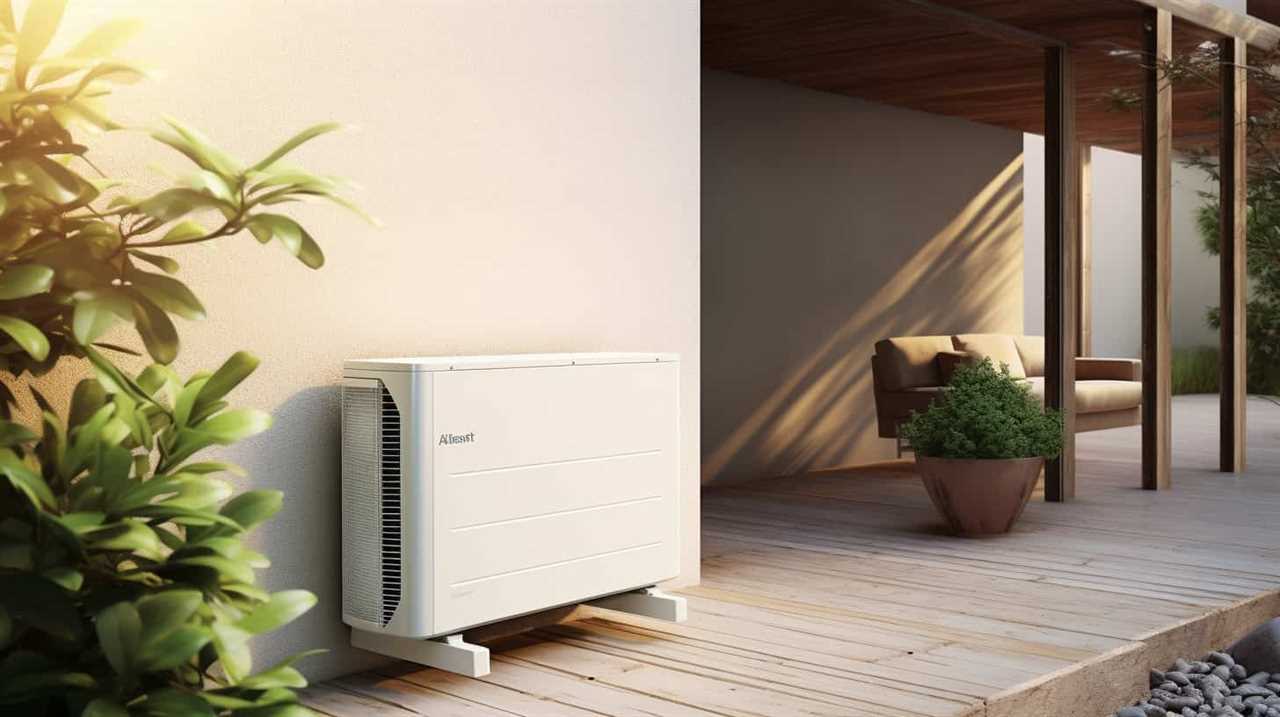
Can I Perform Heat Pump Maintenance Myself, or Should I Always Hire a Professional?
We recommend hiring a professional for heat pump maintenance. While DIY heat pump maintenance may seem appealing, the benefits of hiring a professional include expertise, thorough inspections, and peace of mind.
Are There Any Specific Signs or Indicators That My Heat Pump Is in Need of Immediate Maintenance?
There are common signs that indicate the need for immediate heat pump maintenance. Regular maintenance is important to prevent breakdowns and ensure optimal performance.
What Are the Potential Consequences of Neglecting Regular Heat Pump Maintenance?
Neglecting heat pump maintenance can lead to potential consequences such as decreased energy efficiency, higher utility bills, reduced lifespan of the heat pump, and costly repairs. Regular maintenance is crucial to avoid these issues.
Are There Any Maintenance Tasks That I Can Do on a Monthly or Quarterly Basis to Ensure Optimal Heat Pump Performance?
Monthly tasks include cleaning or replacing air filters, checking and cleaning the outdoor unit, and inspecting the thermostat settings. Quarterly tasks involve cleaning the evaporator and condenser coils, lubricating fan motors, and inspecting electrical connections.
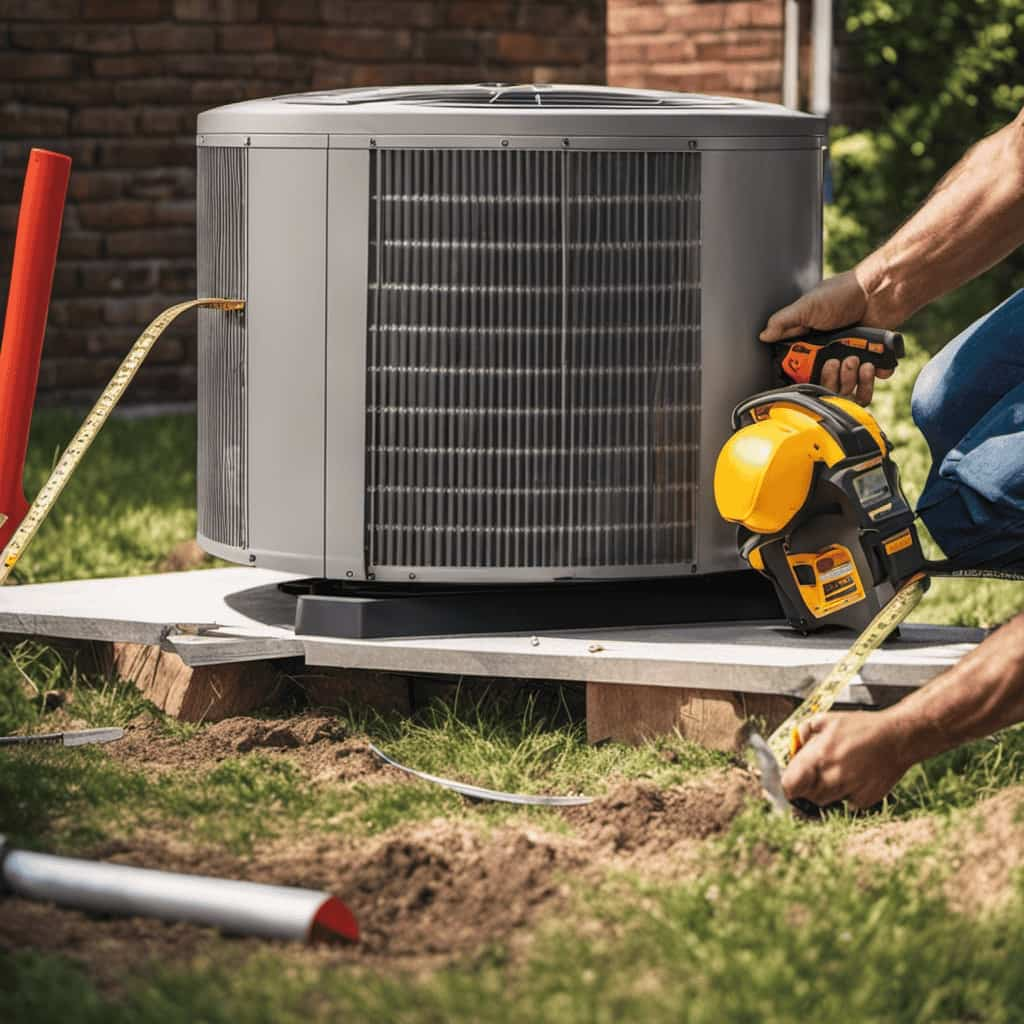
Conclusion
So there you have it, folks. Heat pump maintenance is absolutely crucial for optimal performance.
Who knew that such a complex system could require so much attention?
But hey, it’s all worth it in the end, right?
So go ahead, schedule that professional maintenance and enjoy the irony of spending time and money to keep your heat pump running smoothly. Trust me, you won’t regret it.
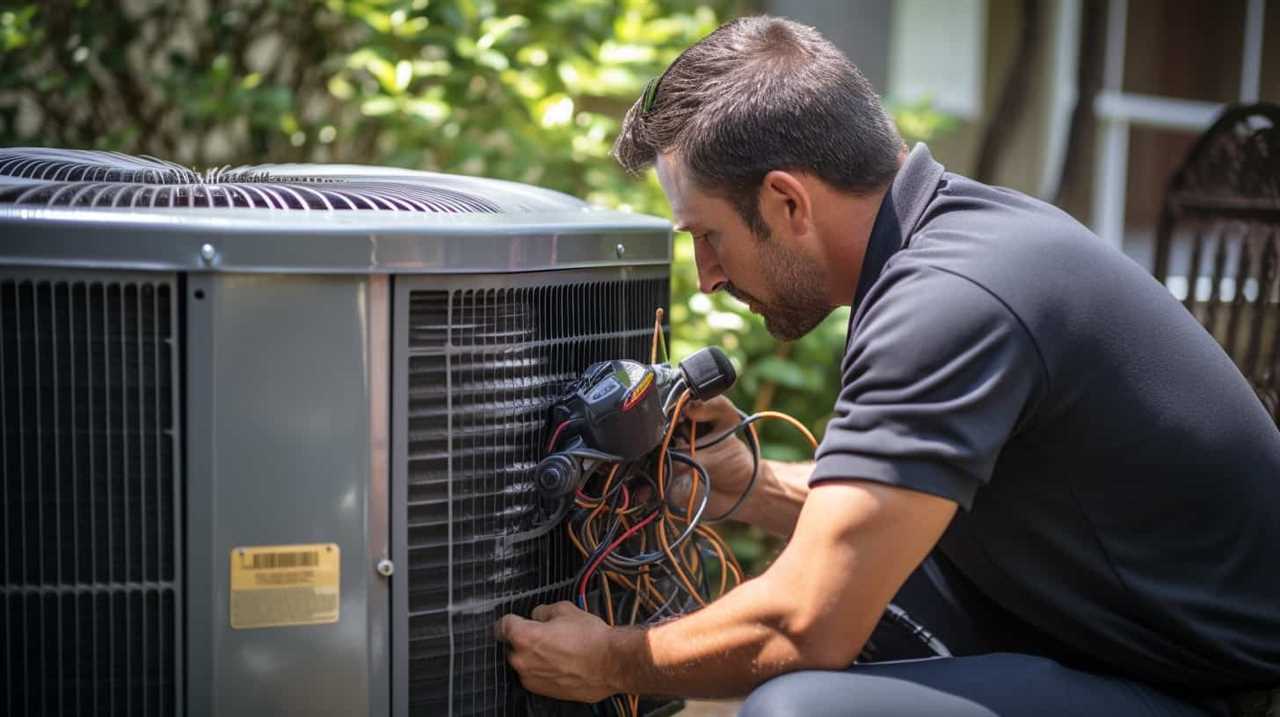
Refrigeration Cycle
Unveiling Secrets of Heat Pump Refrigeration Cycle

We are committed to solving the mysteries of the refrigeration cycle in heat pumps.
We’ll delve into the inner workings of this fascinating system, exploring its components and step-by-step process.
Our goal is to shed light on the heat transfer and compression that drive the cycle, while also explaining its efficiency.
Whether you’re a technician troubleshooting common issues or simply curious about how it all works, join us as we unveil the mysteries of the heat pump refrigeration cycle.

Key Takeaways
- The heat pump refrigeration cycle transfers heat from a low-temperature source to a high-temperature sink.
- Understanding the components and process of the cycle is essential for energy efficiency and maintenance.
- Maximizing efficiency of heat transfer is crucial and can be achieved through factors such as insulation, surface area, and fluid flow.
- Optimizing refrigerant flow, including proper selection and control, is important for system performance.
The Basics of a Heat Pump Refrigeration Cycle
In our discussion of the basics of a heat pump refrigeration cycle, let’s explore its fundamental components and operation.
A heat pump operates by transferring heat from a low-temperature source to a high-temperature sink, utilizing the properties of a refrigerant. The refrigerant plays a crucial role in this process, as it undergoes phase changes and absorbs or releases heat.
The properties of the refrigerant, such as its boiling point and specific heat capacity, dictate the efficiency and performance of the heat pump. By changing the pressure and temperature of the refrigerant, the heat pump can extract heat from the source and deliver it to the sink.
This cycle of compression, condensation, expansion, and evaporation allows the heat pump to provide heating or cooling for various applications. Understanding the operation and characteristics of the refrigerant is essential for optimizing the efficiency and effectiveness of heat pump systems.

Understanding the Components of a Heat Pump Refrigeration Cycle
Let’s take a closer look at the components of a heat pump refrigeration cycle to understand how they work together to transfer heat efficiently. The key components of a heat pump refrigeration cycle include the evaporator, compressor, condenser, and expansion valve.
The evaporator is responsible for absorbing heat from the indoor air and converting it into a gaseous refrigerant. The compressor then increases the pressure and temperature of the refrigerant, making it ready for the next stage.
Next, the refrigerant flows into the condenser, where it releases heat to the outdoor air, causing it to condense into a liquid state. Finally, the expansion valve reduces the pressure of the refrigerant, allowing it to return to the evaporator and continue the cycle.
Understanding these components is crucial for optimizing energy efficiency and ensuring proper heat pump maintenance. Regular maintenance, such as cleaning the coils and checking for refrigerant leaks, can help maintain the performance and efficiency of the heat pump.

Step-by-Step Process of a Heat Pump Refrigeration Cycle
As we delve into the step-by-step process of a heat pump refrigeration cycle, we can gain a deeper understanding of how heat is transferred efficiently.
Here are the key steps involved in this process:
-
Evaporation: The refrigerant absorbs heat from the surrounding air or water, causing it to evaporate and turn into a gas.
-
Compression: The compressor increases the pressure of the refrigerant gas, which raises its temperature.
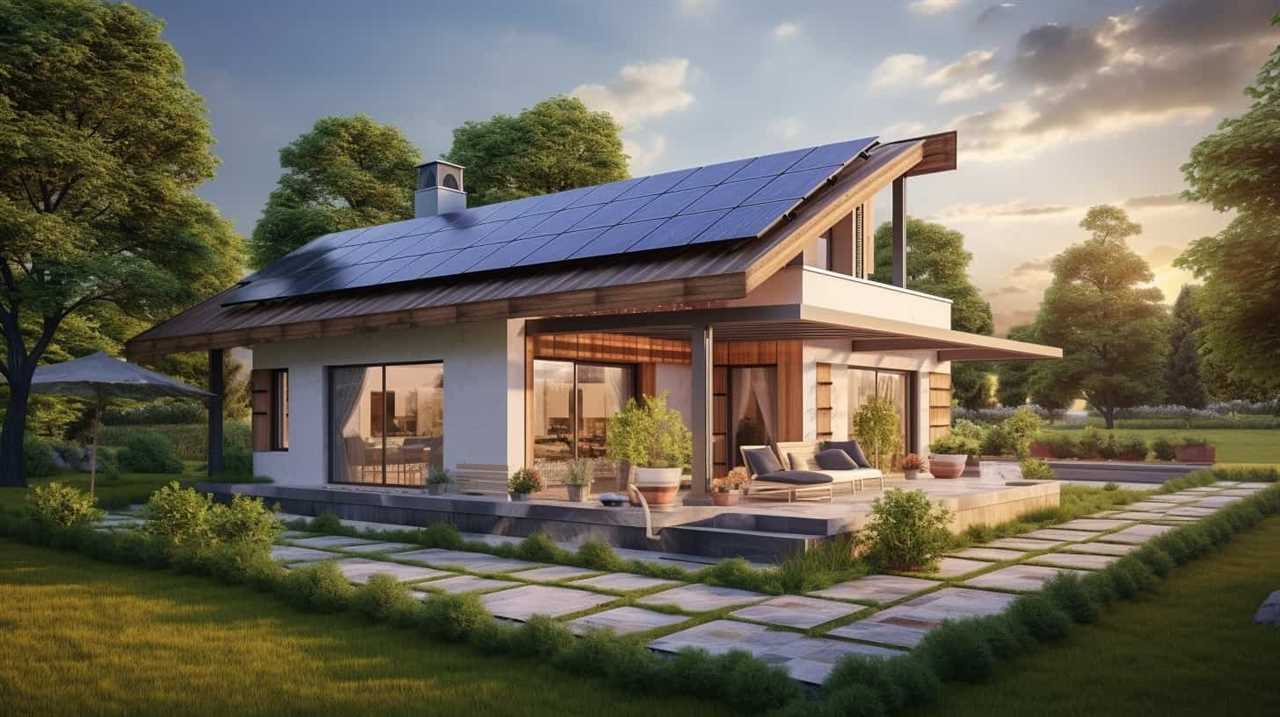
-
Condensation: The hot refrigerant gas is then passed through a condenser, where it releases heat to the surroundings and condenses back into a liquid.
To ensure the smooth functioning of a heat pump refrigeration cycle, it’s important to perform regular maintenance and employ troubleshooting techniques. Regularly cleaning or replacing filters, checking for leaks, and ensuring proper airflow are some maintenance tips that can help optimize the system’s performance.
Understanding the step-by-step process and implementing maintenance techniques will pave the way for effective heat transfer in a heat pump refrigeration cycle.
Heat Transfer in a Heat Pump Refrigeration Cycle
When it comes to heat transfer in a heat pump refrigeration cycle, the efficiency of the process is of utmost importance. Optimizing the flow of refrigerant plays a crucial role in ensuring efficient heat transfer.
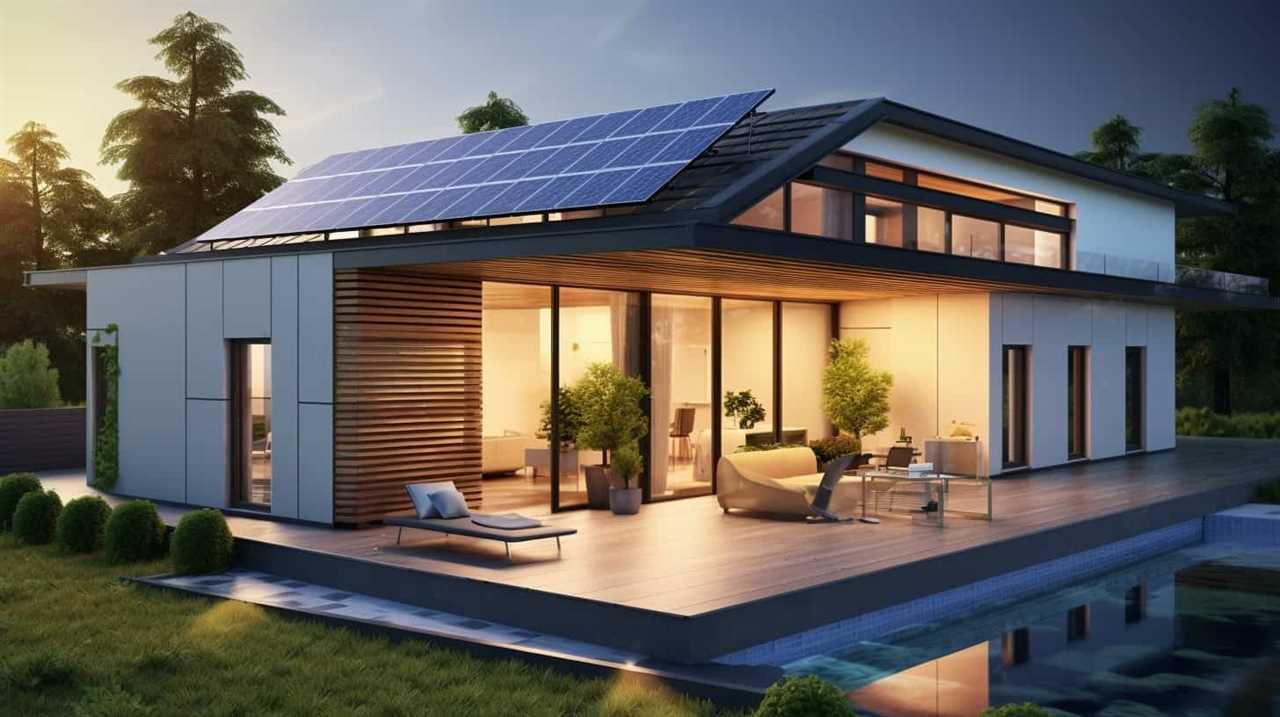
Efficiency of Heat Transfer
Our goal is to maximize the efficiency of heat transfer in the heat pump refrigeration cycle. To achieve this, we can focus on heat transfer enhancement and thermal conductivity improvement. Here are three key factors to consider:
-
Insulation: By improving the insulation of the heat pump system, we can minimize heat loss and maintain a higher level of efficiency. This can be achieved through proper insulation materials and techniques.
-
Surface area: Increasing the surface area of the heat exchanger can enhance heat transfer. This can be done by using fins or other heat transfer enhancement techniques to maximize the contact between the refrigerant and the surrounding environment.
-
Fluid flow: Optimizing the flow of the refrigerant within the system can improve heat transfer efficiency. This can be achieved by designing the system to reduce pressure drops and ensure a uniform flow distribution.
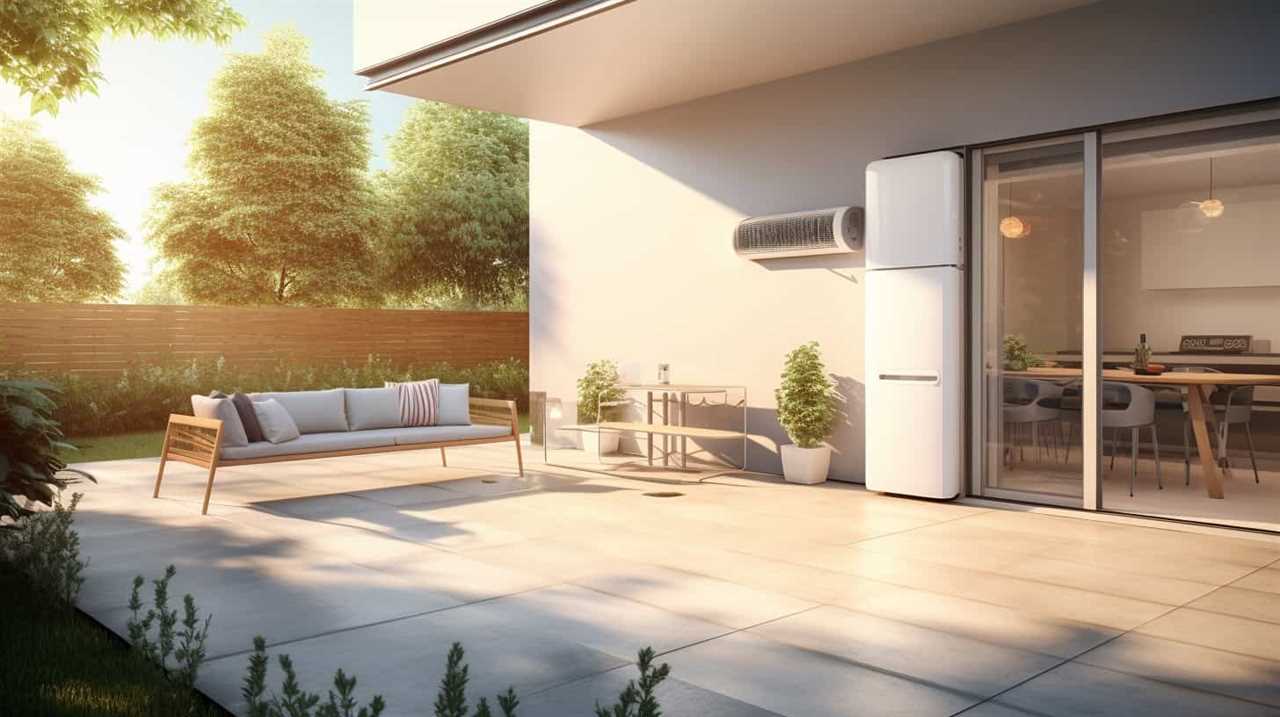
By implementing these strategies, we can enhance the efficiency of heat transfer in the heat pump refrigeration cycle, leading to improved performance and energy savings.
Now, let’s move on to the next section about optimizing refrigerant flow.
Optimizing Refrigerant Flow
To optimize heat transfer in a heat pump refrigeration cycle, we focus on improving the flow of the refrigerant through the system. Proper refrigerant selection and flow control are crucial factors in achieving efficient and effective heat transfer.
The choice of refrigerant is important as it affects the overall performance of the heat pump system. Factors to consider when selecting a refrigerant include its thermodynamic properties, environmental impact, and safety regulations.

Optimal flow control is achieved through the use of expansion valves and variable speed compressors, which allow for precise regulation of the refrigerant flow rate. By ensuring that the refrigerant flows smoothly and consistently through the heat pump system, heat transfer efficiency is maximized, leading to improved performance and energy savings.
The Role of Compression in a Heat Pump Refrigeration Cycle
In the heat pump refrigeration cycle, compression plays a vital role in increasing the temperature and pressure of the refrigerant. This is achieved through the use of a compressor, which compresses the refrigerant gas and raises its temperature.
Here are three important points to understand about the role of compression in the heat pump refrigeration cycle:
-
Compressor Efficiency: The efficiency of the compressor is crucial in ensuring the proper functioning of the heat pump. A more efficient compressor will require less energy to achieve the desired temperature and pressure increase, resulting in lower energy consumption and cost.
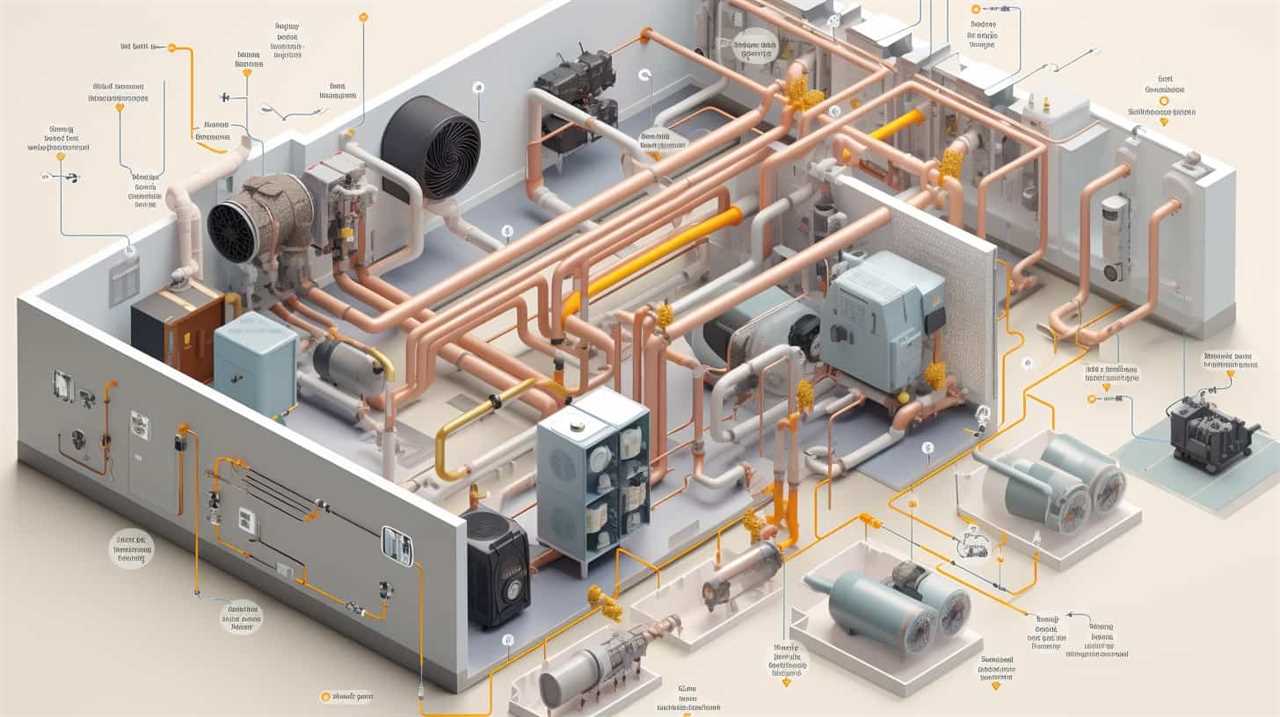
-
Refrigerant Properties: The properties of the refrigerant, such as its specific heat capacity and boiling point, greatly influence the compression process. Understanding these properties helps in selecting the right refrigerant for optimal heat transfer and overall system efficiency.
-
Pressure-Volume Relationship: Compression causes the refrigerant to move from a low-pressure region to a high-pressure region, resulting in an increase in its temperature. This relationship between pressure and volume is fundamental to the operation of the heat pump refrigeration cycle.
Heat Pump Refrigeration Cycle Efficiency Explained
When discussing the efficiency of a heat pump refrigeration cycle, there are several key points to consider.
The first is the Coefficient of Performance (COP), which measures the ratio of heat output to the energy input. This is an important metric in determining the overall efficiency of the heat pump.
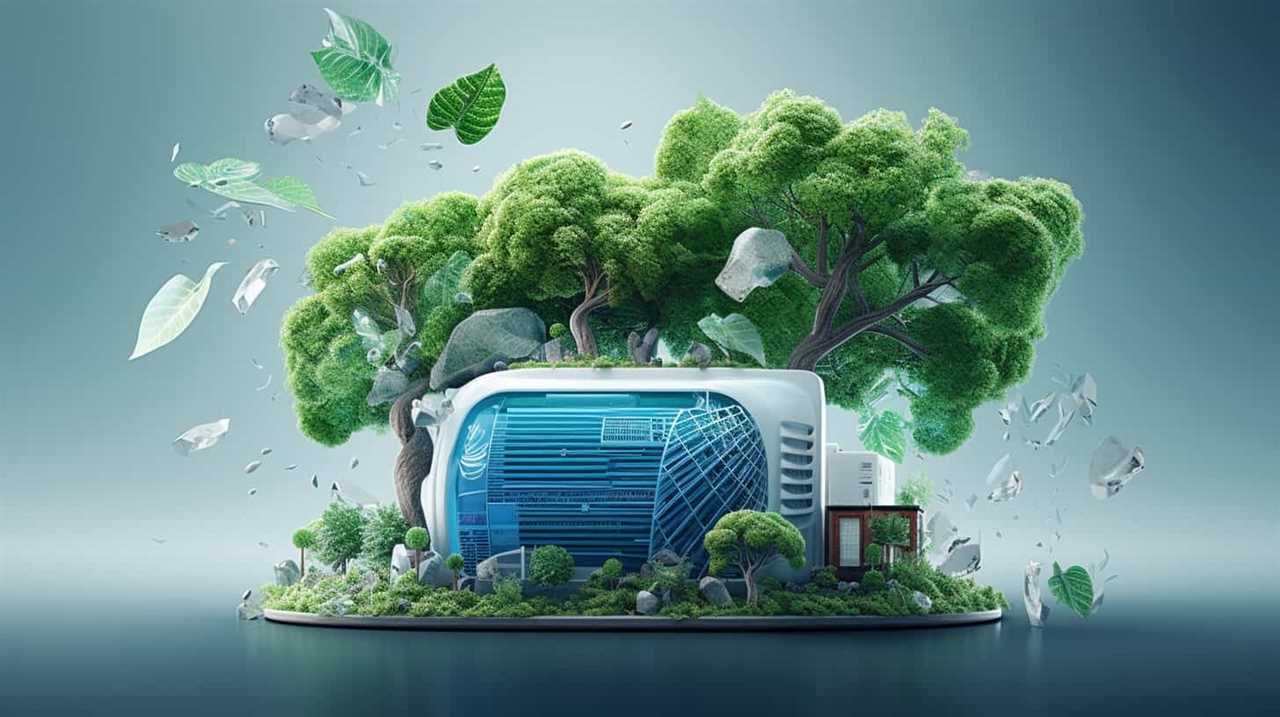
Additionally, energy-saving technology plays a crucial role in maximizing efficiency, such as variable-speed compressors and smart control systems.
Lastly, understanding the heat transfer mechanisms involved in the cycle, including conduction, convection, and radiation, helps optimize the system for optimal efficiency.
Coefficient of Performance
We can measure the efficiency of the heat pump refrigeration cycle by calculating its coefficient of performance. This metric allows us to determine how effectively the heat pump is transferring heat from one location to another.
Here are three key aspects to consider when discussing the coefficient of performance:
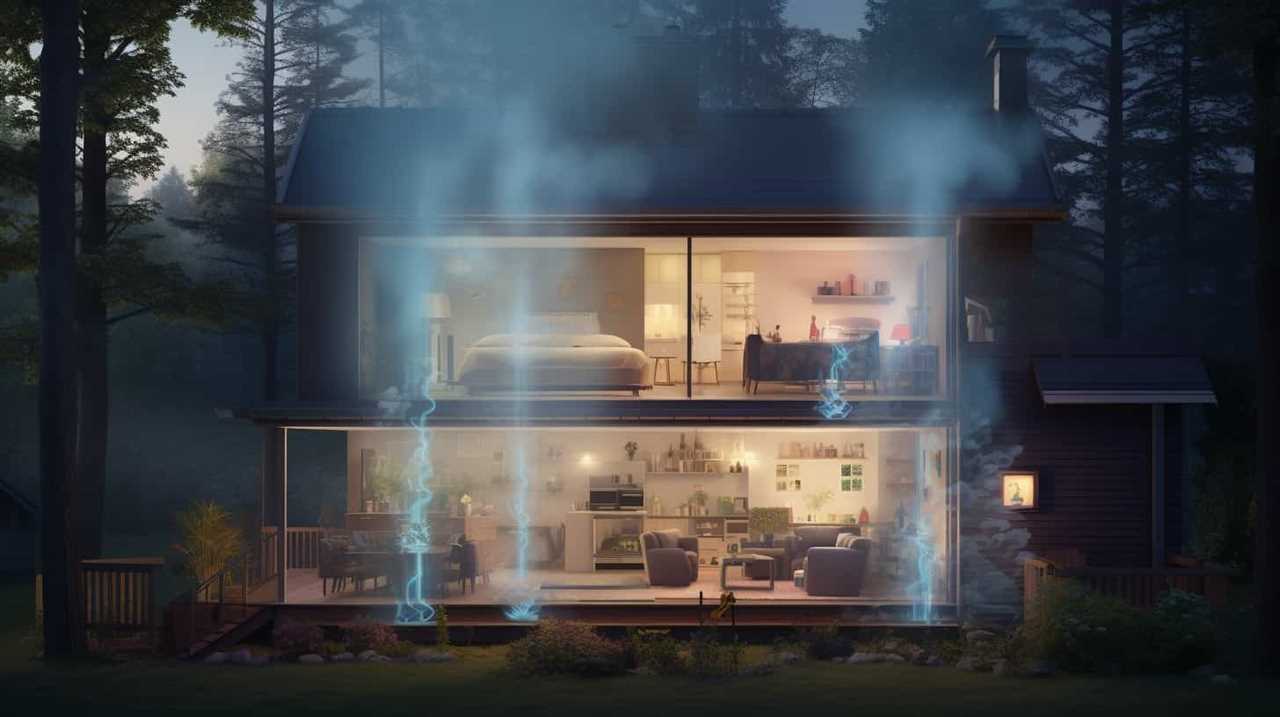
-
Energy Efficiency: The coefficient of performance indicates the ratio of heat output to the amount of electrical energy input required by the heat pump. A higher coefficient of performance means the heat pump is more energy-efficient, resulting in lower energy consumption and cost savings.
-
Heat Pump Maintenance: Regular maintenance is crucial to ensure the heat pump operates at its optimal performance. Factors such as proper refrigerant levels, clean filters, and well-functioning components can positively impact the coefficient of performance.
-
System Design: The coefficient of performance can also be influenced by the design of the heat pump system. Proper sizing, insulation, and ductwork play a significant role in maximizing efficiency.
Understanding the coefficient of performance helps us identify areas for improvement and optimize the heat pump’s energy efficiency.

Now, let’s delve into the next section, which explores energy-saving technology.
Energy-Saving Technology
Our article will now delve into the energy-saving technology that enhances the efficiency of the heat pump refrigeration cycle. Energy-efficient solutions play a vital role in reducing the environmental impact of HVAC systems. By incorporating advanced technology and innovative design, heat pump refrigeration cycles can achieve higher levels of efficiency, resulting in significant energy savings.
One such energy-saving technology is variable-speed compressors. These compressors can adjust their speed based on the cooling or heating demands of the space, ensuring that the system operates at optimal efficiency without unnecessary energy consumption. Additionally, the use of intelligent controls and sensors helps optimize the system’s performance by monitoring and adjusting various parameters in real-time.
Heat Transfer Mechanisms
To enhance the efficiency of the heat pump refrigeration cycle, we employ various heat transfer mechanisms that enable optimal heat transfer between the refrigerant and the surrounding environment. These heat transfer mechanisms play a crucial role in maintaining the desired temperature and maximizing energy savings.
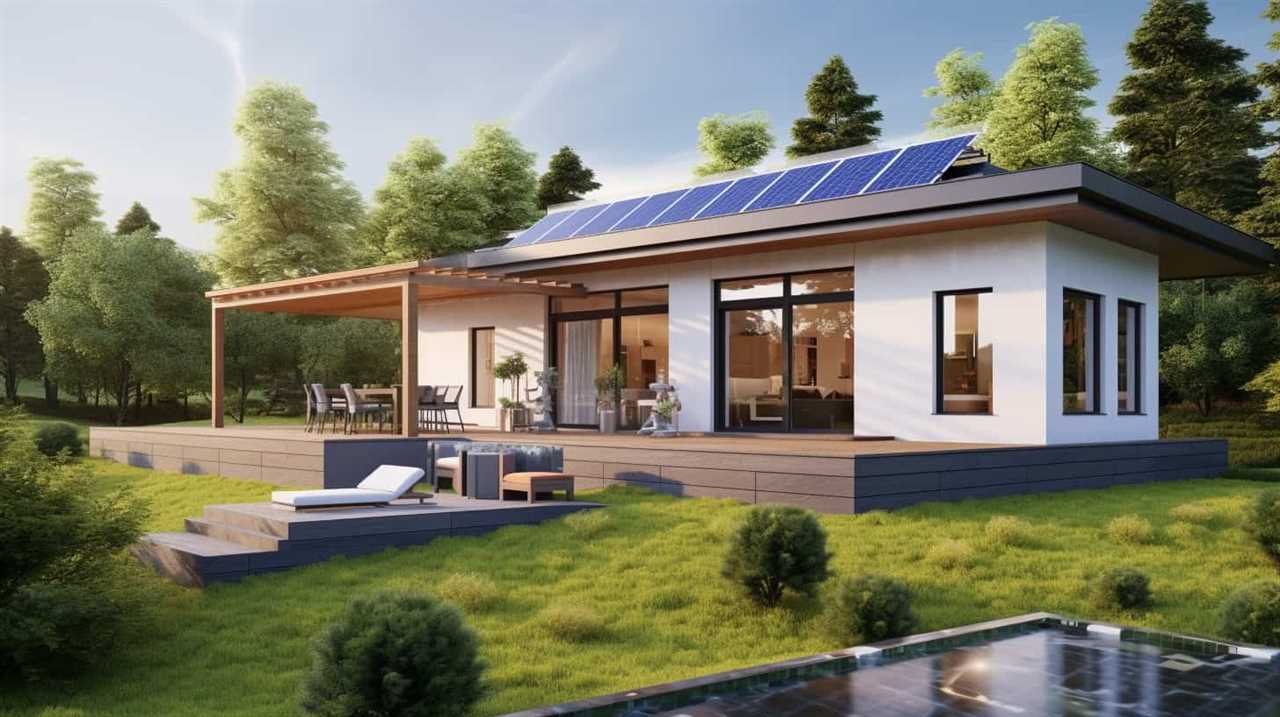
-
Convection: By utilizing convection, heat is transferred through the movement of fluid or air. As the refrigerant absorbs heat from the surroundings, it becomes hotter and rises, allowing cooler air or fluid to take its place and continue the heat transfer process.
-
Conduction: Conduction involves the direct transfer of heat through a solid material. The refrigerant, as it flows through the heat exchanger, comes into contact with the solid walls, transferring heat through the process of conduction.
-
Radiation: Radiation is the transfer of heat through electromagnetic waves. In the heat pump refrigeration cycle, radiation occurs when heat is emitted or absorbed by the refrigerant and surrounding environment.
Troubleshooting Common Issues in a Heat Pump Refrigeration Cycle
Identifying and addressing common issues is essential for maintaining the efficiency of a heat pump refrigeration cycle. Troubleshooting techniques can help diagnose and resolve these issues, ensuring that the heat pump operates optimally.
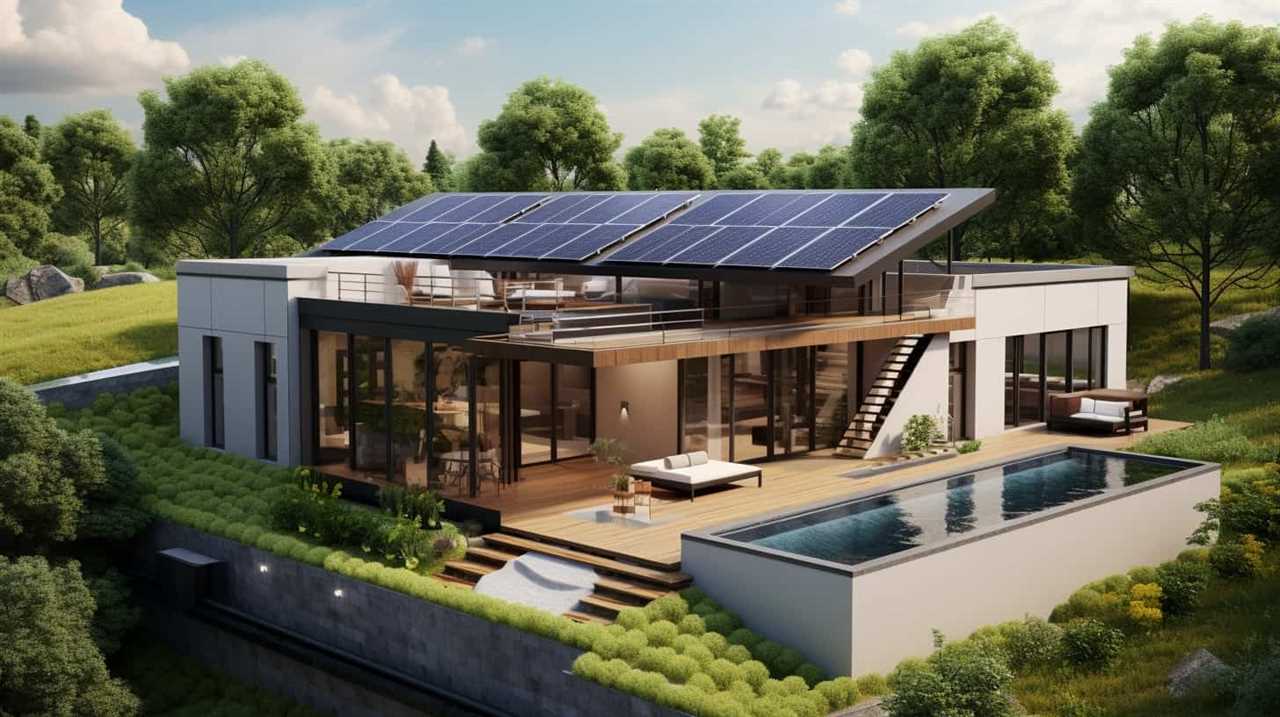
One common maintenance issue is inadequate airflow, which can be caused by dirty air filters or obstructed vents. To address this, regularly clean or replace air filters and ensure that vents are clear of any debris.
Another issue is refrigerant leaks, which can result in reduced cooling or heating capacity. Detecting and repairing these leaks is crucial for restoring the system’s performance.
Additionally, electrical problems such as faulty wiring or malfunctioning components can disrupt the heat pump’s operation. Regular inspections and maintenance checks can help identify and resolve these issues promptly, ensuring the smooth functioning of the heat pump refrigeration cycle.
Frequently Asked Questions
What Are the Different Types of Refrigerants Used in a Heat Pump Refrigeration Cycle?
There are various refrigerant types used in a heat pump refrigeration cycle. These include R-410A, R-134a, and R-32. Each has its advantages and suitability for specific applications. Heat pumps offer efficient heating and cooling solutions for homes.

How Does the Size of a Heat Pump Affect Its Efficiency?
The size of a heat pump is crucial to its efficiency. A larger heat pump can provide more heating or cooling power, but it may also consume more energy, leading to higher heating and cooling costs.
Can a Heat Pump Refrigeration Cycle Be Used for Cooling Purposes Only?
Yes, a heat pump refrigeration cycle can be used for cooling purposes only. However, it is important to consider heat pump efficiency and perform regular heat pump maintenance to ensure optimal performance and energy savings.
Are There Any Environmental Concerns Associated With the Use of Heat Pump Refrigeration Cycles?
There are some environmental concerns associated with heat pump refrigeration cycles. These include the potential for refrigerant leaks, which can contribute to climate change, and the use of electricity, which may not always be generated from renewable sources. However, heat pump refrigeration cycles are generally more energy efficient than other cooling systems, which can help reduce overall environmental impact.
What Are the Main Factors That Can Affect the Lifespan of a Heat Pump Refrigeration Cycle?
Factors affecting the lifespan of a heat pump refrigeration cycle include regular maintenance requirements, such as cleaning the filters and coils, as well as proper installation and sizing of the system.
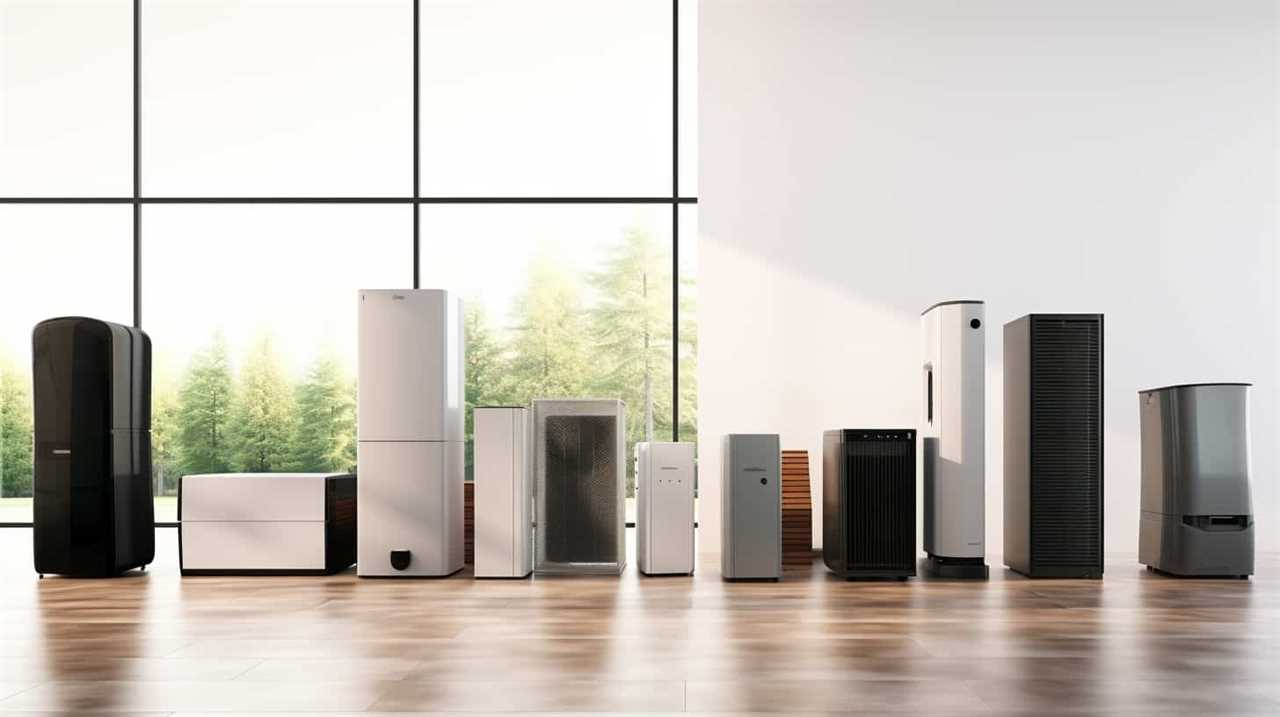
Conclusion
In conclusion, understanding the heat pump refrigeration cycle is crucial for efficient cooling and heating systems.
One interesting statistic that may surprise you is that heat pump refrigeration cycles can achieve an impressive efficiency of up to 300-400%, meaning they produce more energy than they consume.
This remarkable efficiency not only saves energy but also reduces carbon emissions, making heat pump refrigeration cycles a sustainable and environmentally friendly choice.
Refrigeration Cycle
Understand the Intricacies of Heat Pump Refrigeration Cycle

Are you ready to delve into the fascinating world of heat pump refrigeration cycles?
Strap in, because we’re about to take you on a journey through the intricate workings of these systems.
Just like a well-oiled machine, we’ll guide you through the evaporation process, the role of the compressor, and the condensation process.
We’ll also explore heat transfer and insulation, troubleshoot common issues, and show you how to maximize energy efficiency.
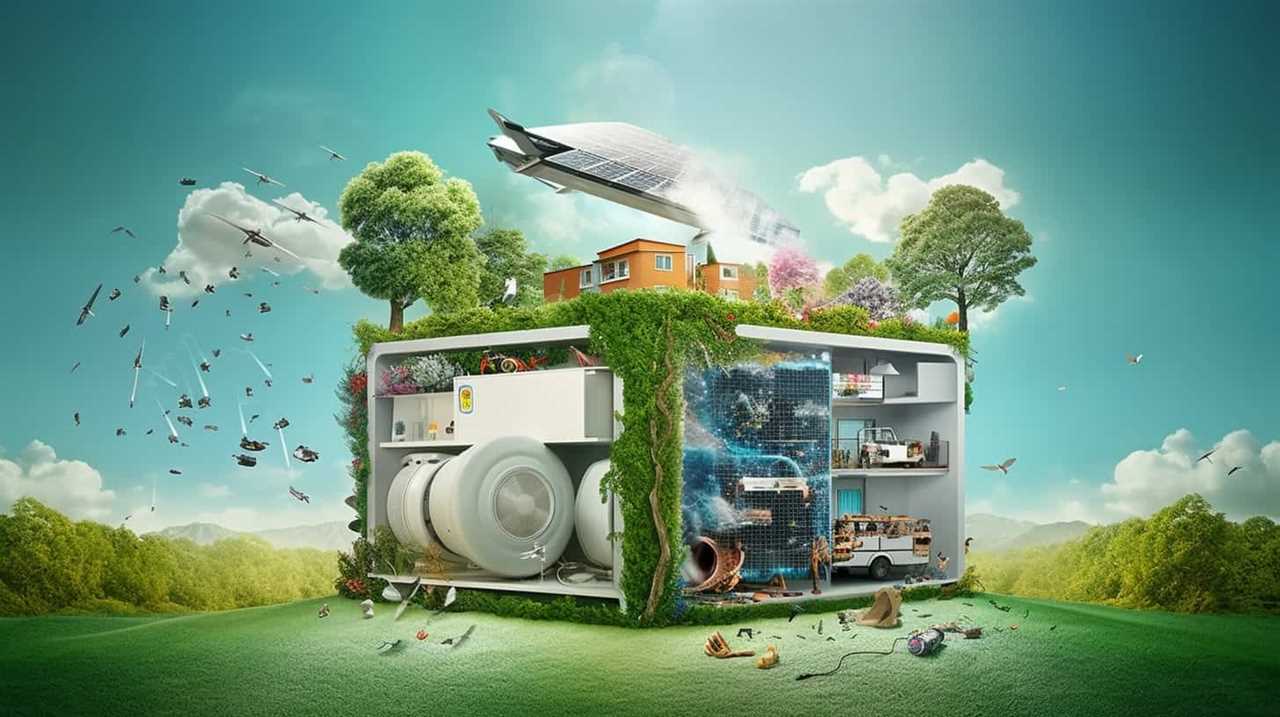
Get ready to become a heat pump expert!
Key Takeaways
- Heat pump technology offers advantages over traditional heating and cooling systems, and understanding its operation is essential to grasp the refrigeration cycle.
- The choice of refrigerants significantly affects the performance and efficiency of heat pump systems, and using environmentally friendly refrigerants is important for sustainability.
- The evaporation process and the role of the compressor are crucial in the refrigeration cycle, as they affect heat transfer and energy efficiency.
- Factors such as the choice of refrigerant, design of heat exchangers, and proper insulation levels and installation all play a role in maximizing heat transfer efficiency and reducing energy losses.
The Basics of Heat Pump Operation
We need to understand the basics of how a heat pump operates in order to grasp the intricacies of its refrigeration cycle.
Heat pump technology offers several advantages over traditional heating and cooling systems, making it an attractive option for many homeowners.
The installation of a heat pump involves a few key steps. First, the outdoor unit is positioned in a suitable location outside the home. Then, refrigerant lines are connected to the indoor unit, which is usually installed in a utility room or basement. The indoor unit is responsible for distributing heated or cooled air throughout the home.
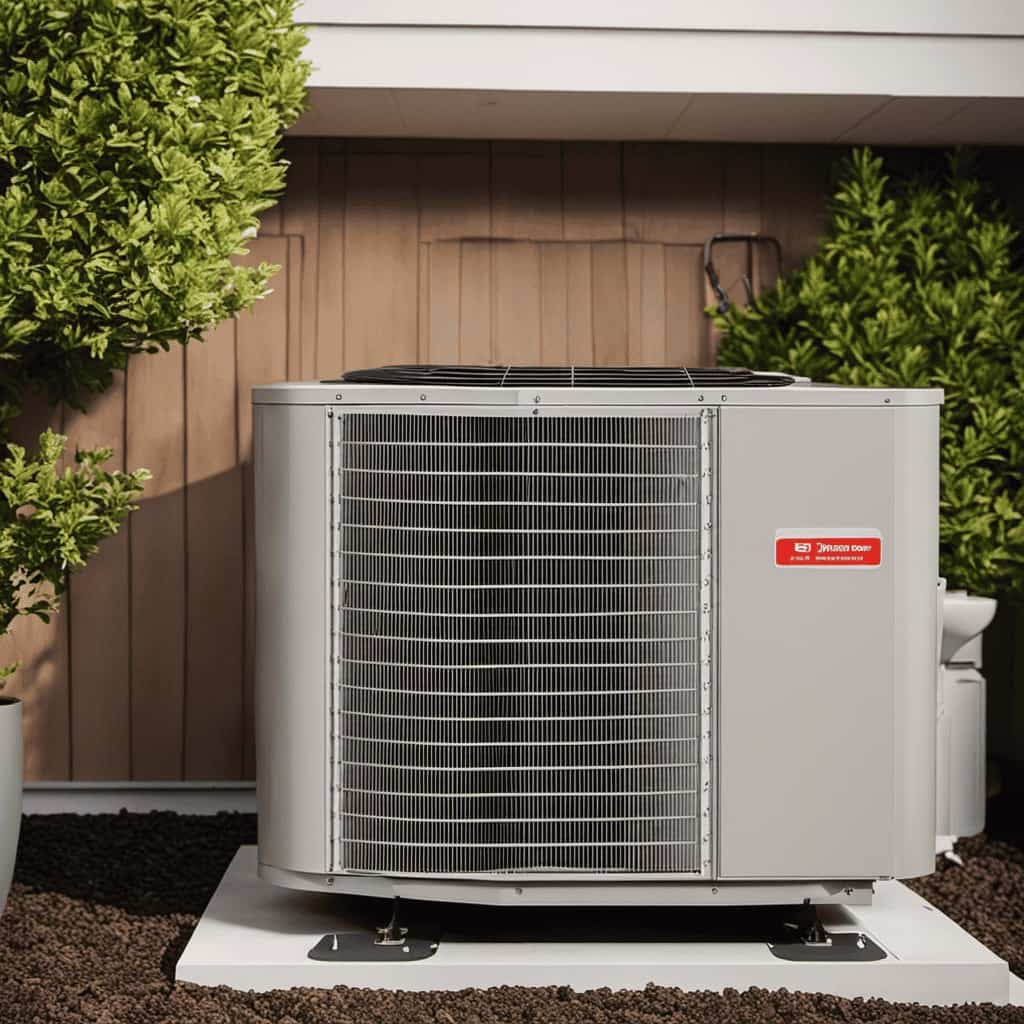
By utilizing the principles of refrigeration, a heat pump can efficiently transfer heat from one area to another, providing both warmth in the winter and coolness in the summer.
Understanding the basics of heat pump operation is essential as we delve further into the role of refrigerants in heat pump systems.
Understanding the Role of Refrigerants in Heat Pump Systems
Refrigerants play a crucial role in the operation of heat pump systems, impacting both their efficiency and environmental impact. It’s important to consider the specific properties of the refrigerants used, such as their thermodynamic characteristics and global warming potential, when designing and operating heat pump systems.
Environmental considerations, such as the phase-out of certain refrigerants due to their ozone depletion potential, also need to be taken into account in order to ensure the sustainability of heat pump technology.

Impact of Refrigerants
As we delve into the intricacies of the heat pump refrigeration cycle, it becomes evident that the choice of refrigerants plays a crucial role in the overall performance and efficiency of the system. The impact of refrigerants can be significant, both in terms of environmental impact and system efficiency. Here are three key points to consider:
-
Refrigerant types: There are various types of refrigerants available, each with its own unique properties and environmental impact. Common refrigerant types include hydrofluorocarbons (HFCs), hydrochlorofluorocarbons (HCFCs), and natural refrigerants such as ammonia and carbon dioxide. Choosing the right refrigerant involves considering factors such as efficiency, safety, and environmental regulations.
-
Environmental regulations: With increasing concerns about climate change and ozone depletion, there are stringent regulations in place to control the use of refrigerants. Many countries have phased out or are in the process of phasing out high-global warming potential (GWP) refrigerants in favor of lower-GWP alternatives. It’s important to stay updated with these regulations to ensure compliance and minimize environmental impact.
-
System efficiency: The choice of refrigerant can greatly impact the efficiency of a heat pump system. Refrigerants with higher heat transfer coefficients and lower pressure drops can enhance the overall performance of the system. Additionally, factors such as refrigerant charge, system design, and maintenance practices can also influence system efficiency.
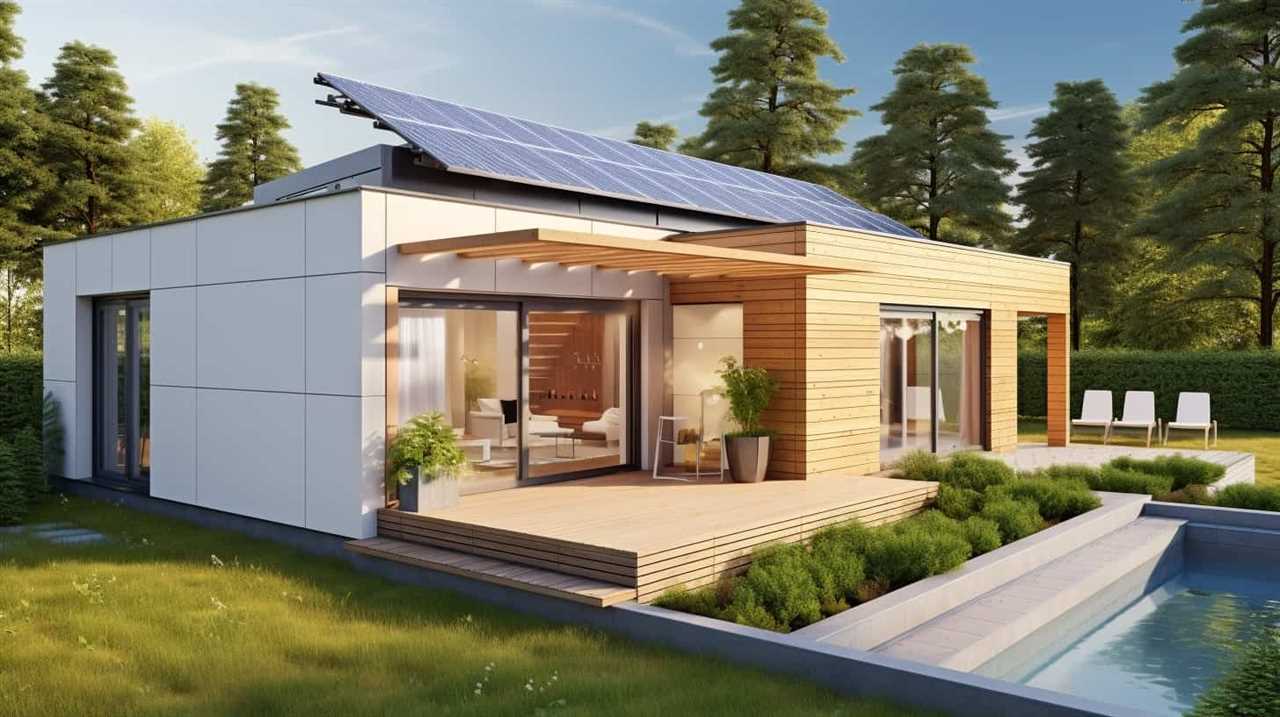
Understanding the impact of refrigerants is crucial for optimizing the performance and efficiency of heat pump systems while complying with environmental regulations. By making informed choices and adopting best practices, we can serve our audience by providing sustainable and efficient heating and cooling solutions.
Environmental Considerations
For optimal environmental considerations, it’s important to understand the role of refrigerants in heat pump systems and the impact they have on sustainability and efficiency.
Refrigerants play a crucial role in the heat pump cycle as they facilitate the transfer of heat from one location to another. However, certain refrigerants have been found to have detrimental effects on the environment, such as contributing to global warming and depleting the ozone layer.
To address these concerns, there has been a shift towards using refrigerants that have a lower global warming potential and zero ozone depletion potential. This shift towards more environmentally friendly refrigerants not only helps in reducing emissions but also promotes sustainable practices.

The Evaporation Process in a Heat Pump Refrigeration Cycle
We actively participate in the evaporation process within a heat pump refrigeration cycle. Evaporation is a crucial step in the cycle, where the refrigerant, in a low-pressure state, absorbs heat from the surrounding environment and undergoes a phase change from a liquid to a vapor.
This process occurs in the evaporator coil, where the refrigerant enters as a low-temperature liquid and exits as a low-temperature vapor. The evaporation efficiency is determined by factors such as the temperature difference between the refrigerant and the surrounding environment, the surface area of the evaporator coil, and the evaporation rate.
It’s important to optimize the evaporation process to maximize the heat transfer and improve the overall efficiency of the heat pump system. As we move on to discuss the role of the compressor in heat pump operation, it’s essential to understand the significance of the evaporation process in the refrigeration cycle.
The Role of the Compressor in Heat Pump Operation
The compressor plays a crucial role in the operation of a heat pump. Its main function is to compress the refrigerant, raising its temperature and pressure. This is essential for the refrigerant to release heat during the condensation process.
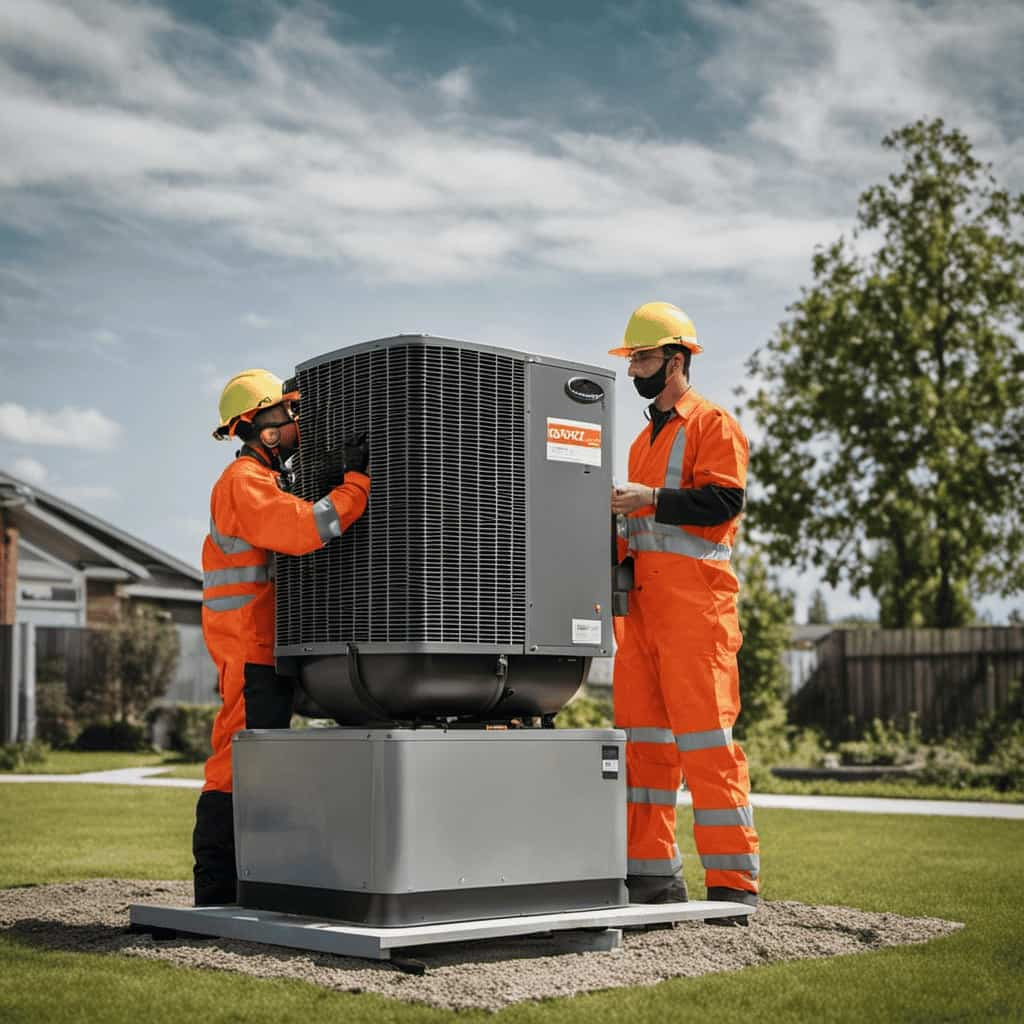
The efficiency of the compressor is of utmost importance, as it directly affects the overall performance and energy consumption of the heat pump system.
Regular maintenance and proper care of the compressor are necessary to ensure its optimal functioning and longevity.
Compressor’s Function and Design
To fully grasp the inner workings of a heat pump, it’s essential to understand the role and design of the compressor, which plays a crucial part in the operation of the system. The compressor is responsible for pressurizing the refrigerant, increasing its temperature and pressure to facilitate heat transfer.
Here are three key aspects to consider when discussing the function and design of the compressor:

-
Compressor Efficiency: The efficiency of the compressor is vital for the overall performance of the heat pump. Higher efficiency means lower energy consumption and reduced operating costs. Regular maintenance, such as cleaning or replacing air filters, lubricating moving parts, and checking refrigerant levels, can help optimize the compressor’s efficiency.
-
Compressor Maintenance: Proper maintenance is essential to ensure the compressor’s longevity and reliability. Regular inspections, cleaning, and servicing can help identify and address potential issues before they escalate. This includes checking for leaks, monitoring refrigerant levels, and ensuring proper airflow.
-
Compressor Design: Compressor design varies depending on the specific heat pump system. Factors such as size, capacity, and type of refrigerant impact the design choices. It’s crucial to select a compressor that matches the system requirements to ensure optimal performance and efficiency.
Understanding the function and design of the compressor is crucial for maintaining the efficiency and performance of a heat pump system. Regular maintenance and selecting the right compressor design can contribute to a reliable and energy-efficient operation.

Importance of Compressor Efficiency
Maintaining high compressor efficiency is crucial for optimizing the performance of a heat pump system. The compressor plays a vital role in the heat pump operation by compressing the refrigerant gas, raising its temperature and pressure, and facilitating heat transfer.
However, over time, the compressor may experience wear and tear, which can lead to reduced efficiency and performance. Regular compressor maintenance is essential to prevent these issues and ensure optimal operation.
Energy-saving techniques, such as keeping the compressor clean and free from debris, ensuring proper lubrication, and monitoring refrigerant levels, can help improve compressor efficiency. Additionally, regular inspections, timely repairs, and replacing worn-out parts can also contribute to maintaining high compressor efficiency.
Compressor Maintenance Tips
Our top compressor maintenance tip is regularly cleaning and inspecting the compressor to ensure optimal heat pump operation. Here are three key compressor maintenance techniques that can help troubleshoot compressor issues:

-
Check for refrigerant leaks: Inspect the compressor for any signs of refrigerant leakage such as oil stains or hissing sounds. Leaks can lead to reduced cooling capacity and inefficient operation.
-
Clean the condenser coil: Dust and debris can accumulate on the condenser coil, reducing heat transfer and causing the compressor to work harder. Regularly clean the coil using a soft brush or compressed air to maintain efficient heat exchange.
-
Lubricate moving parts: The compressor contains various moving parts that require lubrication to reduce friction and prevent wear. Check the manufacturer’s guidelines for the recommended lubrication schedule and use the appropriate lubricant.
By following these compressor maintenance techniques, you can ensure the longevity and efficiency of your heat pump system.
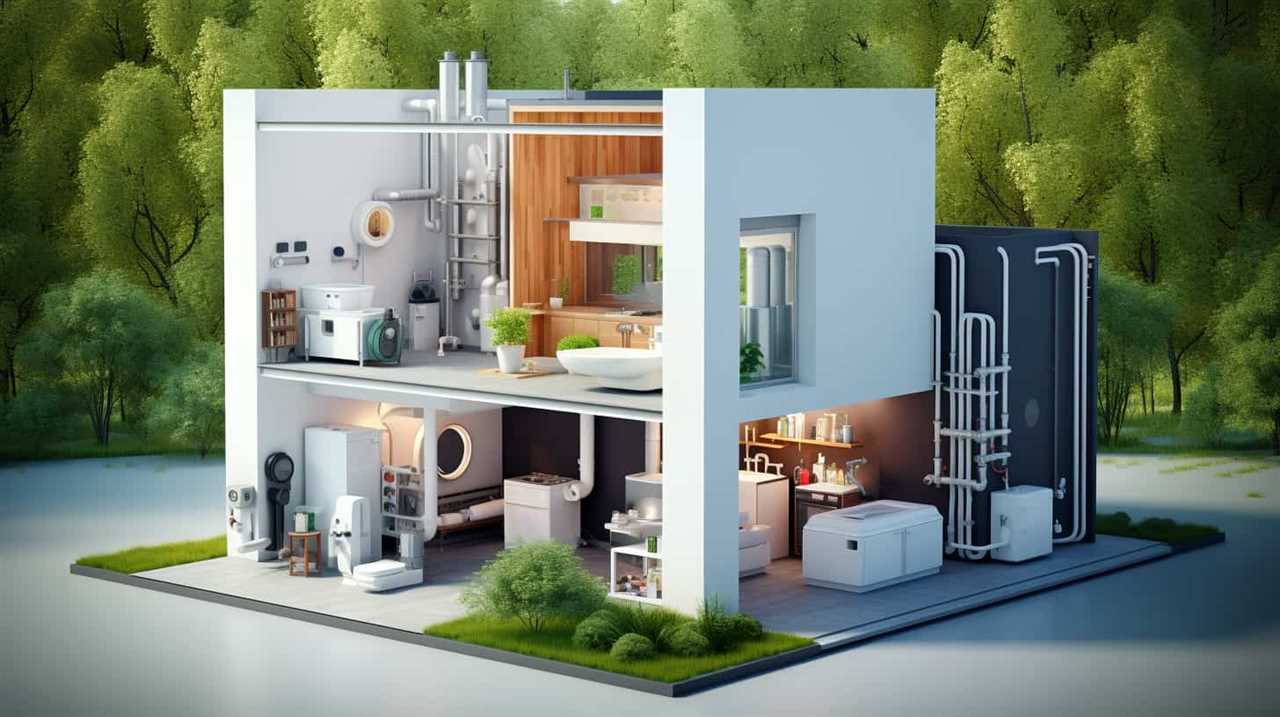
Now, let’s move on to discussing the condensation process in a heat pump refrigeration cycle.
The Condensation Process in a Heat Pump Refrigeration Cycle
During the condensation process in a heat pump refrigeration cycle, we extract heat from the refrigerant gas as it transitions to a liquid state. This is a crucial step in the refrigeration cycle as it allows the heat pump to transfer heat from a lower temperature source to a higher temperature sink. To better understand the condensation process, let’s take a look at the following table:
| Stage | Description | Purpose |
|---|---|---|
| 1 | High-pressure, high-temperature refrigerant gas enters the condenser. | To release heat and cool the gas. |
| 2 | The refrigerant gas cools and condenses into a high-pressure liquid. | To remove heat from the gas and prepare it for the expansion process. |
| 3 | Heat is transferred to the surroundings as the refrigerant releases heat energy. | To maintain a temperature difference between the refrigerant and the surroundings. |
| 4 | The refrigerant exits the condenser as a high-pressure liquid. | To continue to the next stage of the refrigeration cycle. |
Exploring the Expansion Valve in Heat Pump Systems
Let’s explore how the expansion valve works in heat pump systems. The expansion valve is a critical component in the refrigeration cycle that controls the flow of refrigerant. Its primary function is to reduce the pressure of the refrigerant as it enters the evaporator.
Here are three key points to understand about the expansion valve:
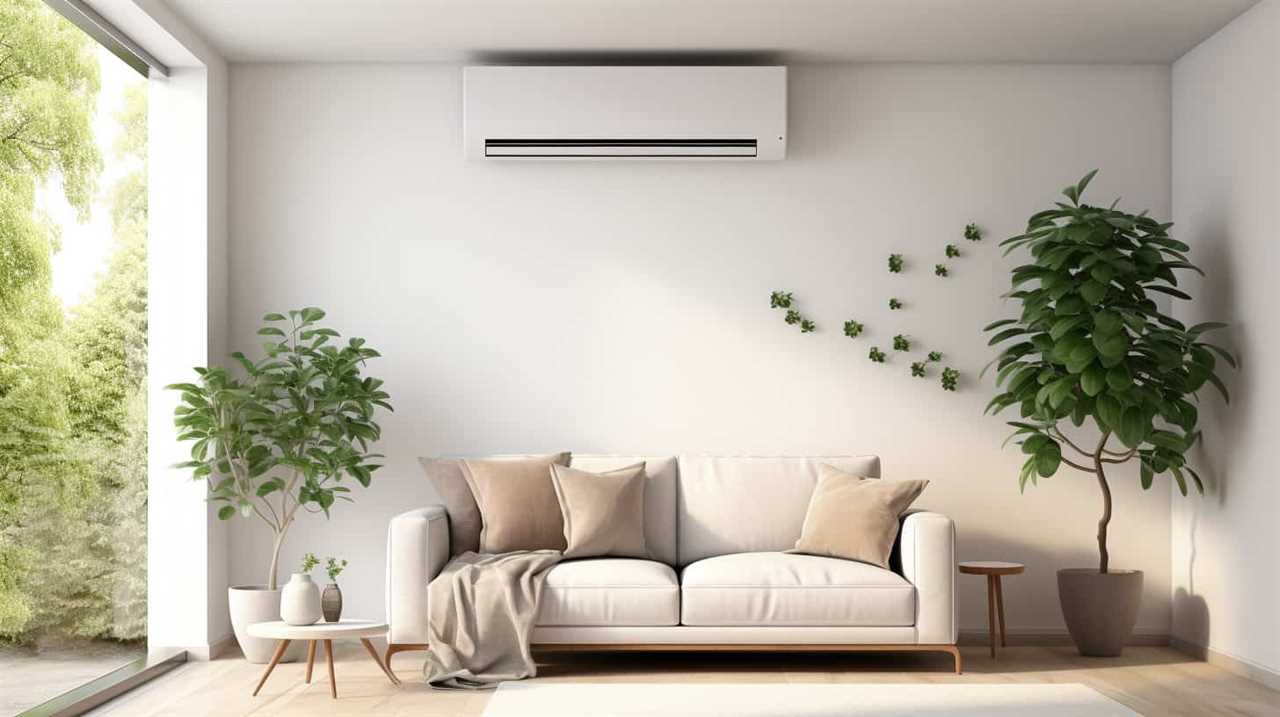
-
Expansion Valve Function: The expansion valve acts as a metering device that regulates the flow of refrigerant from the high-pressure side to the low-pressure side of the system. It ensures that the refrigerant enters the evaporator at the right pressure and temperature for efficient heat transfer.
-
Expansion Valve Efficiency: The efficiency of the expansion valve is crucial for optimal system performance. It must be able to accurately control the flow of refrigerant and maintain the desired pressure drop across the valve. This helps to maximize the heat transfer capacity of the evaporator and improve overall system efficiency.
-
Importance of Proper Sizing: The expansion valve needs to be properly sized for the specific heat pump system. If the valve is too small, it can restrict the flow of refrigerant and cause inefficiencies. On the other hand, if the valve is too large, it can lead to poor temperature control and reduced system performance.
Understanding the function and efficiency of the expansion valve is essential for ensuring the proper operation of a heat pump system. Now, let’s transition into the subsequent section about heat transfer in a heat pump refrigeration cycle.
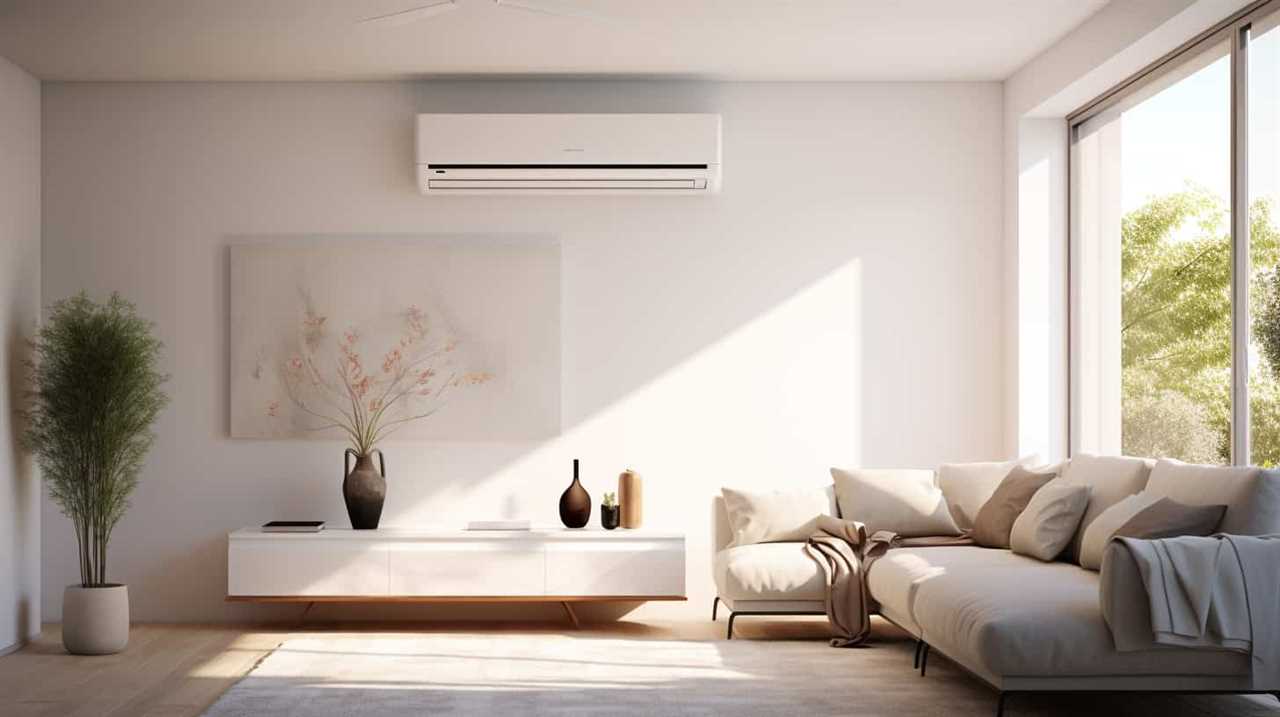
Heat Transfer in a Heat Pump Refrigeration Cycle
Heat transfer occurs within a heat pump refrigeration cycle as the refrigerant absorbs and releases heat during its journey through the system. The efficiency of heat transfer is a crucial consideration in heat pump design.
To achieve optimal heat transfer efficiency, several factors must be taken into account. One such factor is the choice of refrigerant, as different refrigerants have varying heat transfer properties.
Additionally, the design of heat exchangers plays a vital role in facilitating efficient heat transfer. Proper sizing and placement of heat exchangers ensure maximum contact between the refrigerant and the medium being heated or cooled.
Furthermore, the flow rate of the refrigerant must be carefully controlled to maintain efficient heat transfer. By addressing these heat pump design considerations, we can enhance the heat transfer efficiency of the system.
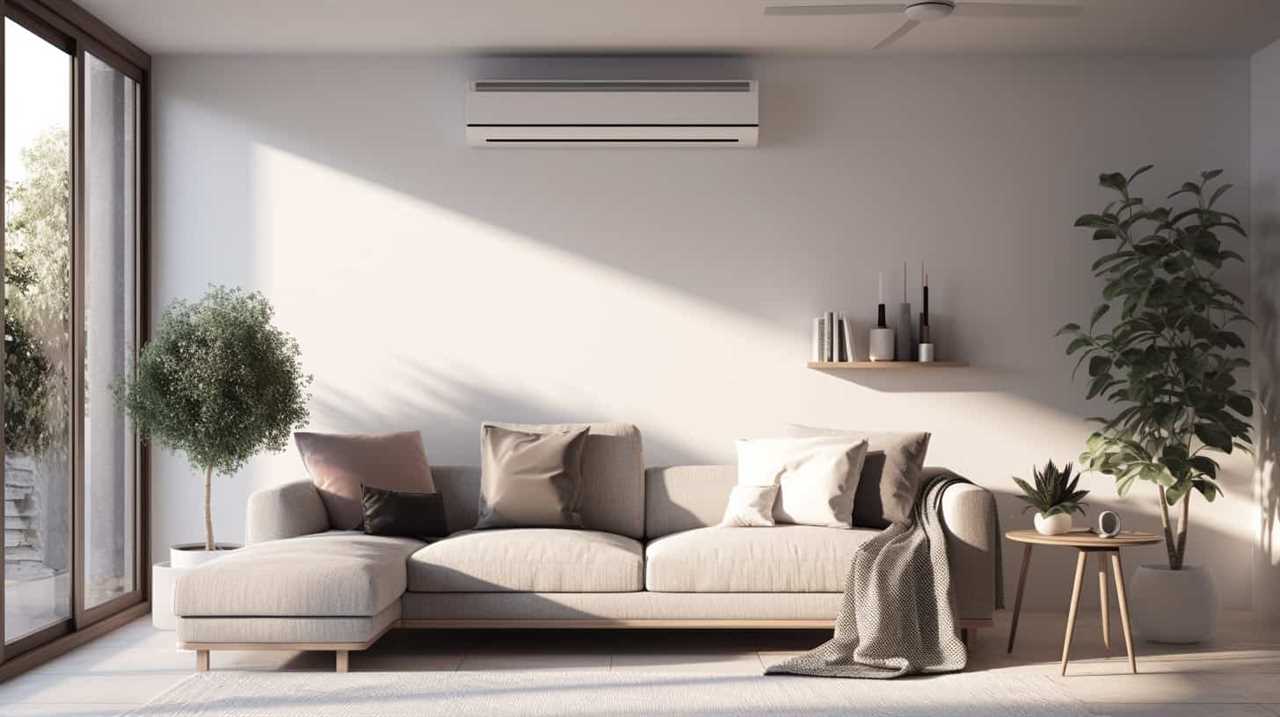
This leads us to the next topic: the importance of proper insulation in heat pump efficiency.
The Importance of Proper Insulation in Heat Pump Efficiency
Proper insulation plays a crucial role in maximizing heat pump efficiency. By minimizing heat transfer, insulation helps to reduce energy losses and improve overall system performance.
Ensuring optimal insulation levels is essential for achieving energy savings and maintaining the desired temperature in a heat pump system.
Insulation and Energy Savings
Our insulation plays a crucial role in maximizing our heat pump’s efficiency and energy savings. Proper insulation is essential for maintaining optimal temperature levels inside our homes, reducing heat loss or gain, and ultimately saving energy. Here are three key factors to consider when it comes to insulation and energy savings:
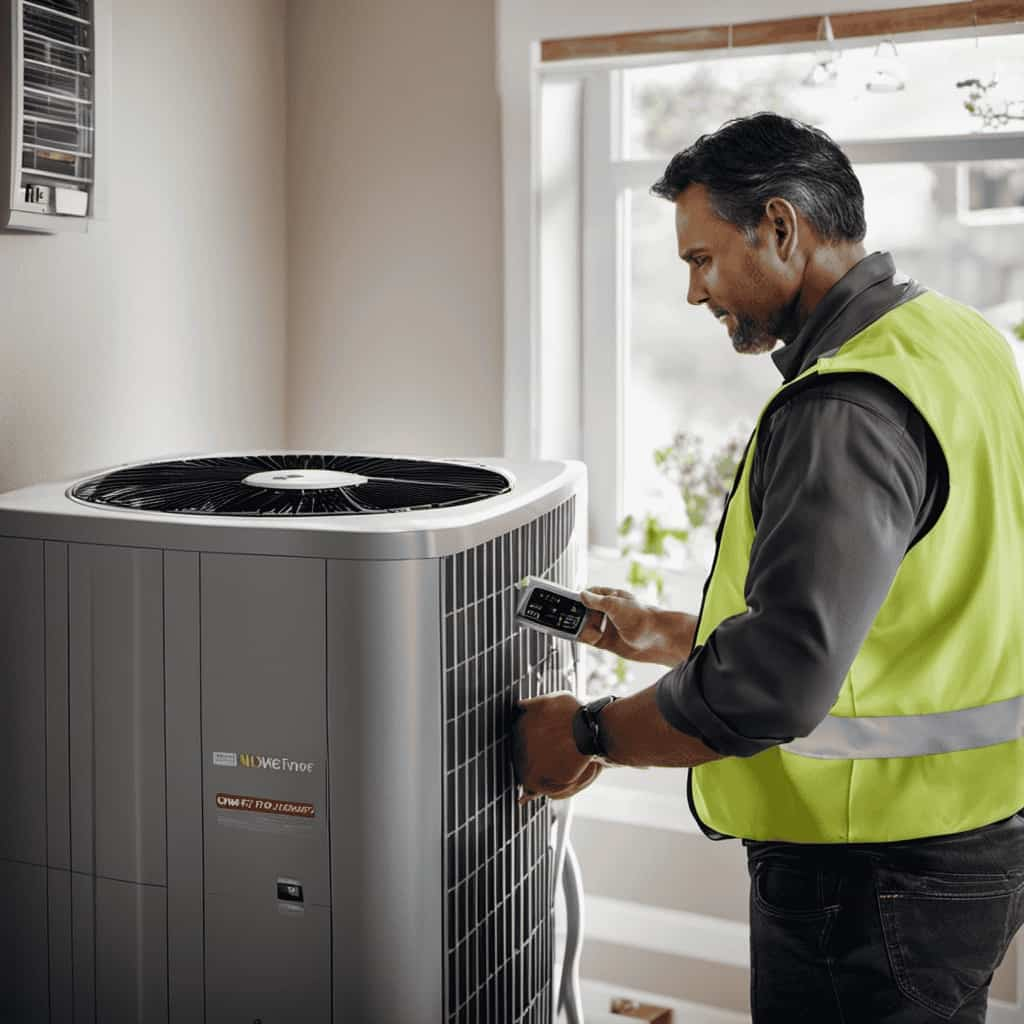
-
Insulation Benefits:
Insulation acts as a barrier, preventing the transfer of heat between the inside and outside of our homes. By reducing heat loss during colder months and heat gain during warmer months, insulation helps to maintain a comfortable indoor environment without over-reliance on our heat pump system. This leads to significant energy savings and lower utility bills. -
Insulation Types:
There are various insulation types available, including fiberglass, cellulose, spray foam, and rigid foam. Each type has its own thermal resistance properties, installation requirements, and cost considerations. Choosing the right insulation type for our specific needs is crucial to ensure maximum energy efficiency. -
Proper Installation:
Proper installation of insulation is critical for its effectiveness. Gaps, leaks, or inadequate coverage can compromise the insulation’s performance and lead to energy loss. It’s essential to hire a professional to ensure proper installation, as they’ve the knowledge and expertise to achieve optimal results.
Impact on Heat Transfer
With the right insulation, we can significantly improve the efficiency of our heat pump by minimizing heat transfer. Heat transfer is the movement of thermal energy from one object to another, and in the case of a heat pump, it can have a significant impact on its performance.

Proper insulation helps to prevent heat loss or gain during the refrigeration cycle, ensuring that the heat pump operates at its optimal efficiency. Insulation acts as a barrier, reducing the transfer of heat between the indoor and outdoor environments. This means that less energy is required to heat or cool the space, resulting in improved heat pump efficiency and performance.
By investing in high-quality insulation materials and ensuring proper installation, we can maximize the benefits of our heat pump and achieve greater energy savings.
In the next section, we’ll explore additional factors that are crucial in ensuring optimal performance of our heat pump.
Ensuring Optimal Performance
To achieve optimal performance, we must ensure that proper insulation is in place and that heat transfer is minimized in our heat pump refrigeration cycle. Improving performance and optimizing efficiency are crucial in order to provide the best service to our customers.
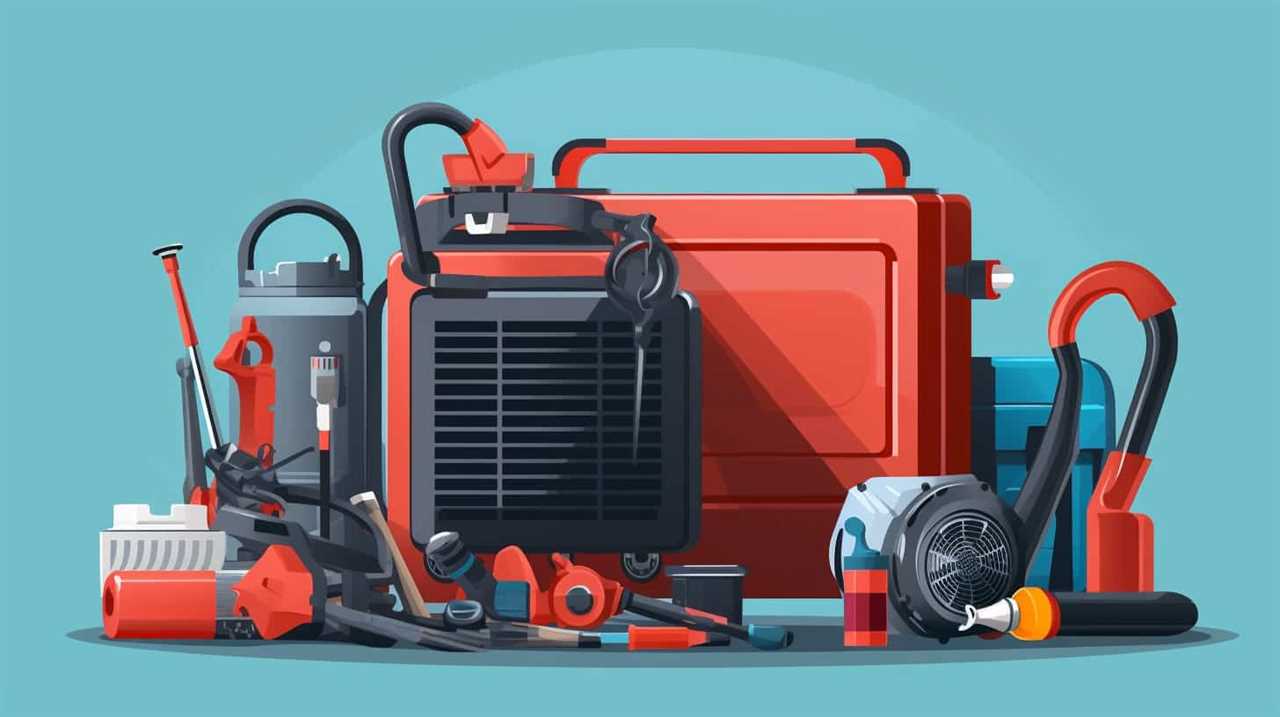
Here are three key factors to consider when it comes to insulation:
-
Insulation material: Choosing the right insulation material is essential for reducing heat transfer. Materials such as fiberglass, foam board, and cellulose insulation offer excellent thermal resistance, helping to maintain the desired temperature inside the system.
-
Insulation thickness: The thickness of the insulation also plays a significant role in minimizing heat transfer. Thicker insulation provides better resistance to heat flow, resulting in improved energy efficiency.
-
Proper installation: Ensuring proper installation of the insulation is vital to avoid any gaps or air leaks. Any gaps can lead to heat loss or gain, which negatively impacts the overall efficiency of the heat pump system.
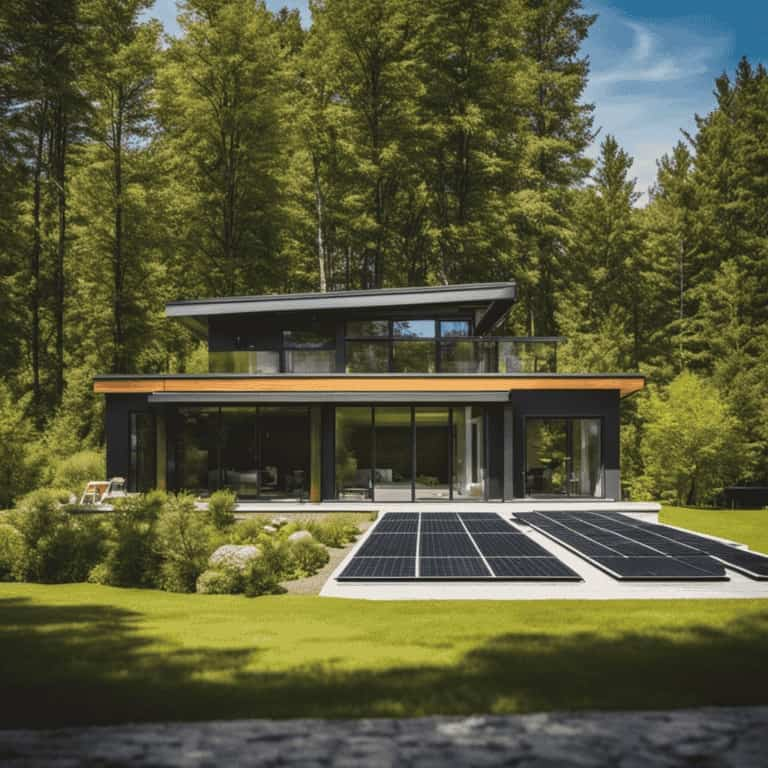
By implementing these insulation measures, we can enhance the performance and efficiency of our heat pump refrigeration cycle.
Now, let’s delve into troubleshooting common issues in heat pump refrigeration cycles.
Troubleshooting Common Issues in Heat Pump Refrigeration Cycles
We can identify and resolve common issues in heat pump refrigeration cycles by following a systematic troubleshooting process. When troubleshooting heat pump refrigeration cycles, it’s essential to have a good understanding of the system’s components and how they interact with each other.
Some common malfunctions in heat pump refrigeration cycles include inadequate heating or cooling, low airflow, refrigerant leaks, and electrical problems. To diagnose these issues, it’s important to use troubleshooting techniques such as checking for error codes, inspecting electrical connections, measuring temperatures and pressures, and examining airflow.
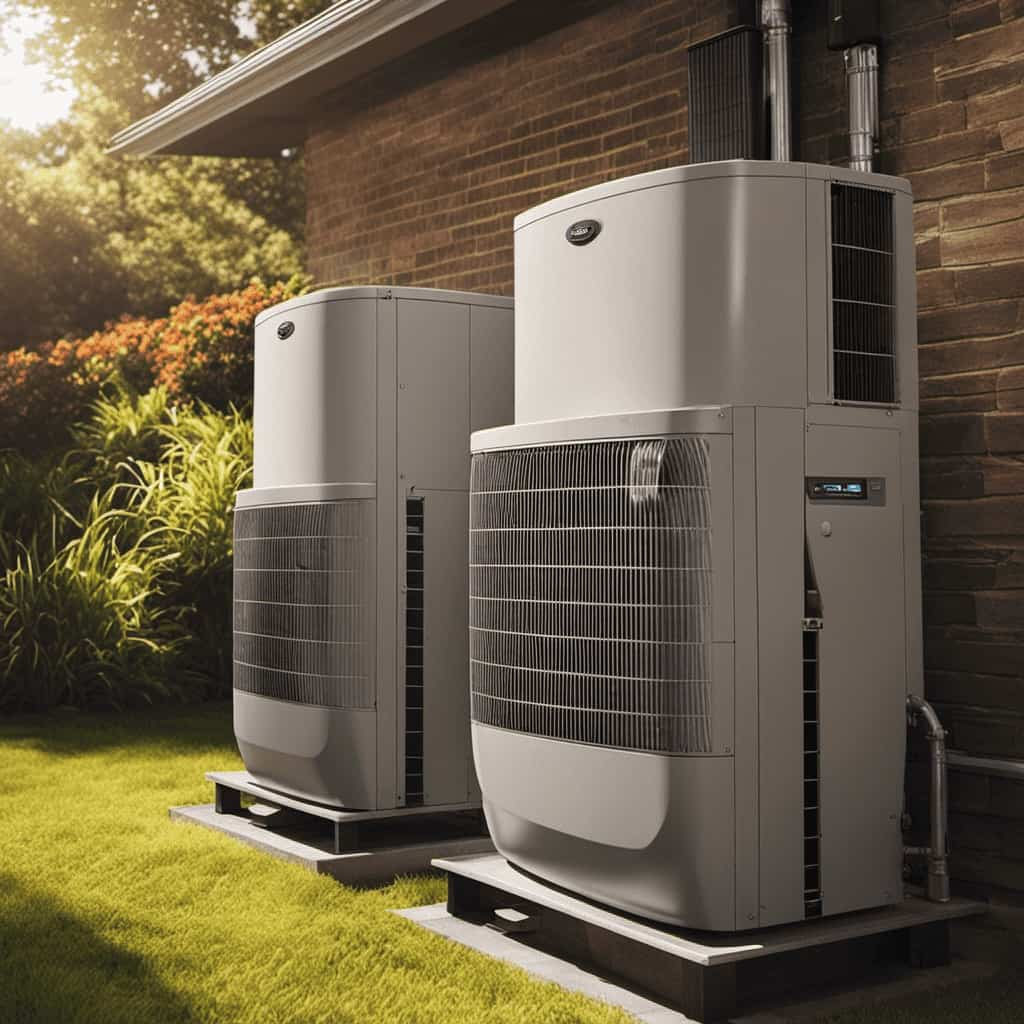
Once the problem is identified, it can be resolved by repairing or replacing faulty components, recharging refrigerant if needed, or adjusting settings. By effectively troubleshooting these common issues, we can ensure that heat pump refrigeration cycles operate optimally and efficiently.
Transitioning into the subsequent section about maximizing energy efficiency in heat pump operation, let’s explore some strategies to minimize energy consumption while maintaining comfort.
Maximizing Energy Efficiency in Heat Pump Operation
To optimize energy efficiency in heat pump operation, we can implement various strategies that enhance the system’s performance and minimize energy consumption.
Here are three effective ways to maximize energy savings and improve heat pump performance:

-
Regular maintenance: Conducting routine maintenance is crucial for ensuring the optimal functioning of a heat pump. This includes cleaning or replacing filters, inspecting coils and connections, and lubricating moving parts. Regular maintenance helps to prevent energy waste and extends the lifespan of the heat pump.
-
Proper insulation: Ensuring that your home is well-insulated can significantly reduce heat loss and gain, allowing the heat pump to operate more efficiently. Insulating walls, ceilings, and floors, as well as sealing air leaks, helps to maintain a consistent indoor temperature and reduces the workload on the heat pump.
-
Thermostat management: Adjusting the thermostat settings can have a significant impact on energy consumption. Lowering the temperature in winter and raising it in summer by a few degrees can lead to substantial energy savings. Additionally, using programmable thermostats allows for customized temperature schedules, optimizing comfort and efficiency.
Frequently Asked Questions
Can a Heat Pump Be Used to Cool a Space as Well as Heat It?
Yes, a heat pump can be used to cool a space in addition to heating it. This is achieved by reversing the refrigeration cycle. The efficiency and lifespan of a heat pump depend on regular maintenance and proper installation.
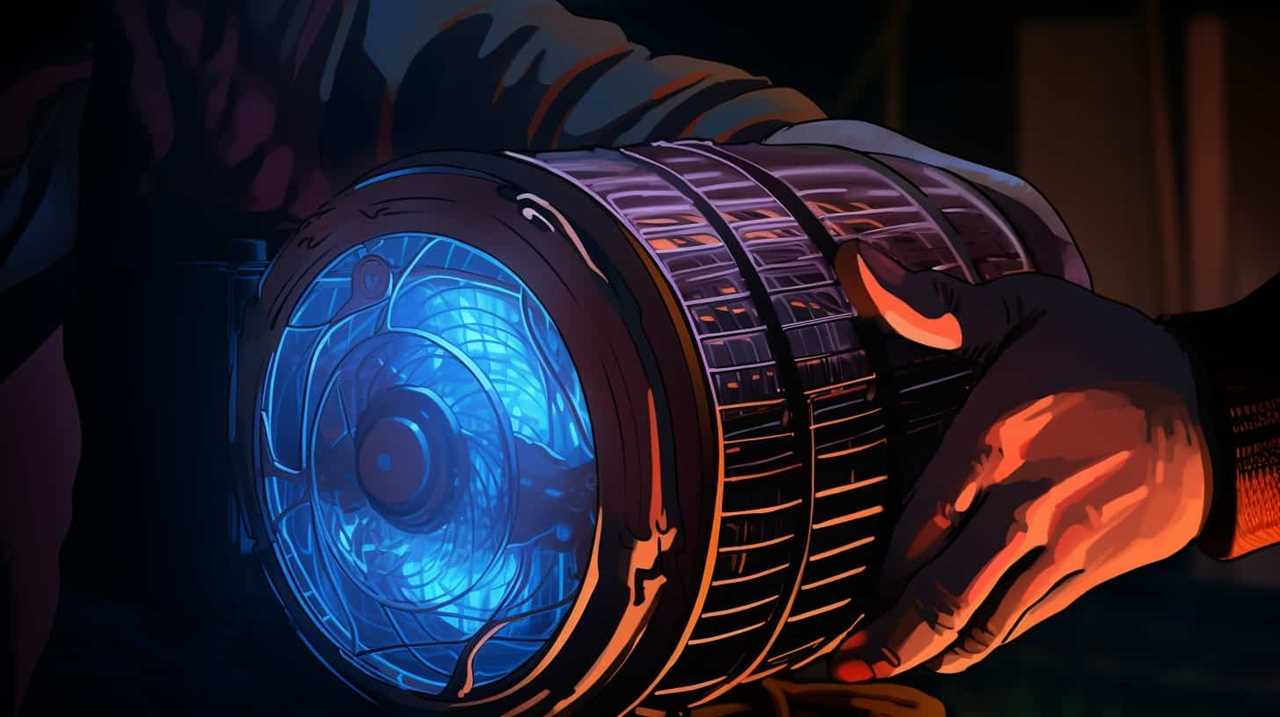
How Does the Efficiency of a Heat Pump Compare to Other HVAC Systems?
The efficiency of a heat pump compared to other HVAC systems is remarkable. It allows for significant energy savings, making it an excellent choice for both heating and cooling.
What Is the Average Lifespan of a Heat Pump?
The average lifespan of a heat pump varies depending on factors such as maintenance requirements. Regular maintenance can help extend the lifespan of a heat pump, ensuring optimal performance and efficiency.
Are There Any Government Incentives or Rebates Available for Purchasing a Heat Pump?
Yes, there are government incentives and rebates available for purchasing a heat pump. These programs can help offset the cost and make it more affordable for homeowners to invest in energy-efficient heating and cooling solutions.
Can a Heat Pump Be Used in Extreme Climates With Very Cold Temperatures?
Yes, a heat pump can be used in extreme climates with very cold temperatures. However, it’s important to consider heat pump sizing and regular heat pump maintenance to ensure optimal performance in these conditions.
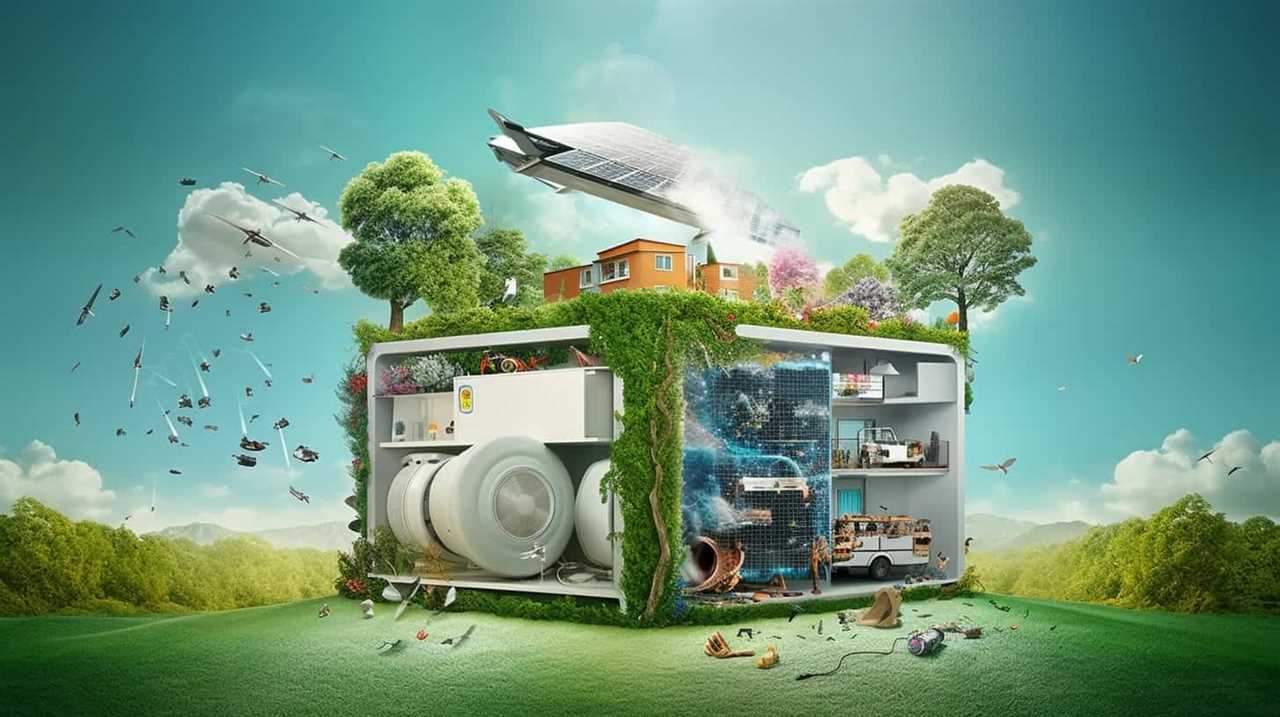
Conclusion
In conclusion, understanding the intricacies of the heat pump refrigeration cycle is crucial for efficient operation.
By comprehending the role of refrigerants, the processes of evaporation and condensation, and the importance of heat transfer and insulation, users can maximize energy efficiency.
For example, proper insulation can significantly reduce heat loss and improve overall performance.
By troubleshooting common issues and implementing energy-saving techniques, heat pump systems can provide reliable heating and cooling while minimizing energy consumption.
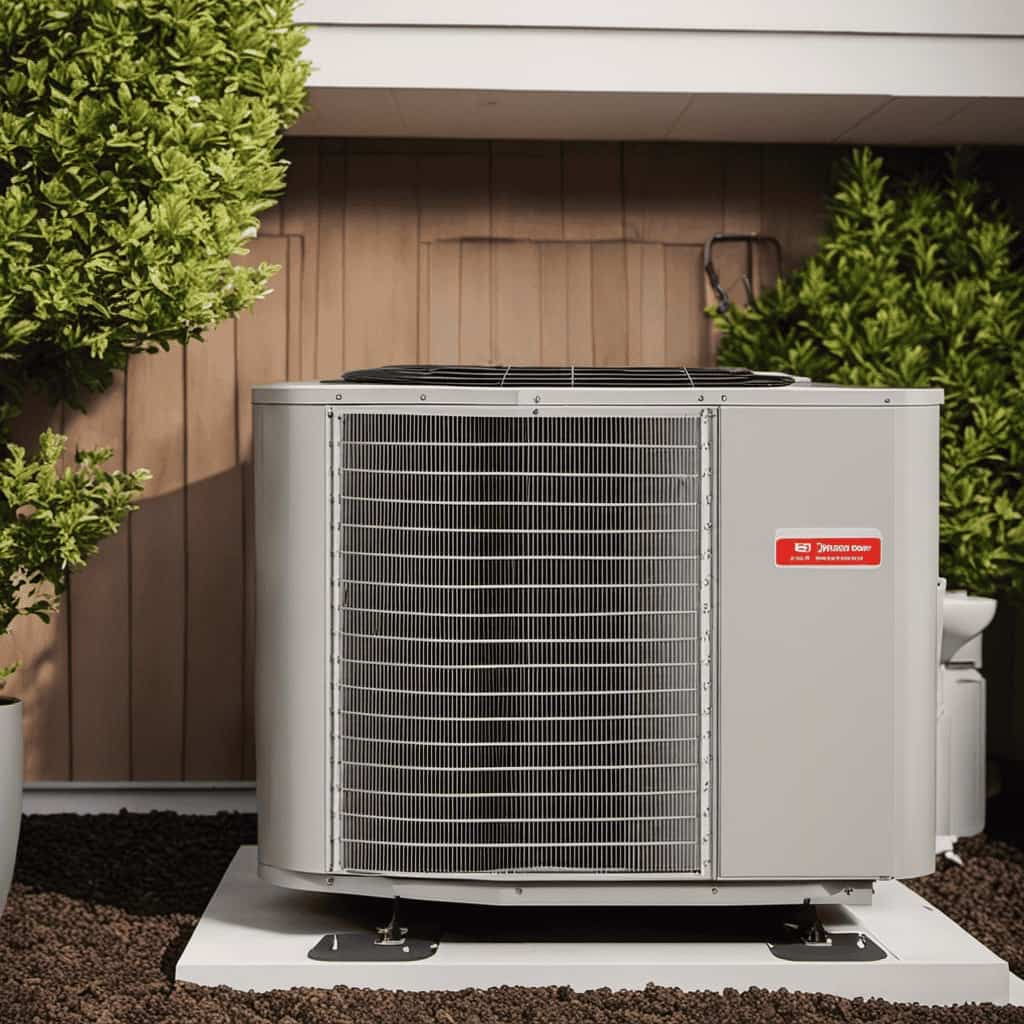
-

 Residential and Commercial Applications3 months ago
Residential and Commercial Applications3 months agoBest Amana Heat Pump Reviews
-

 Thermal Energy Transfer3 months ago
Thermal Energy Transfer3 months agoBreakthroughs in Modern Heat Pump Systems: Thermal Energy Edition
-

 Residential and Commercial Applications3 months ago
Residential and Commercial Applications3 months agoBest Heat Pump
-

 Geothermal Heat Pumps2 months ago
Geothermal Heat Pumps2 months agoUpgrade Your Comfort with Our Efficient HVAC Systems
-

 Geothermal Heat Pumps2 months ago
Geothermal Heat Pumps2 months agoInnovative Geothermal Heat Pump Manufacturers Revolutionize Energy Efficiency
-

 Air Conditioning4 weeks ago
Air Conditioning4 weeks agoExploring Energy-Efficient Air Conditioning Heat Pumps
-

 Thermal Energy Transfer3 months ago
Thermal Energy Transfer3 months agoBoost Your Heat Pump Efficiency: Interactive Guide
-

 Residential and Commercial Applications3 months ago
Residential and Commercial Applications3 months agoBest Portable Heat Pump Heat & AC










